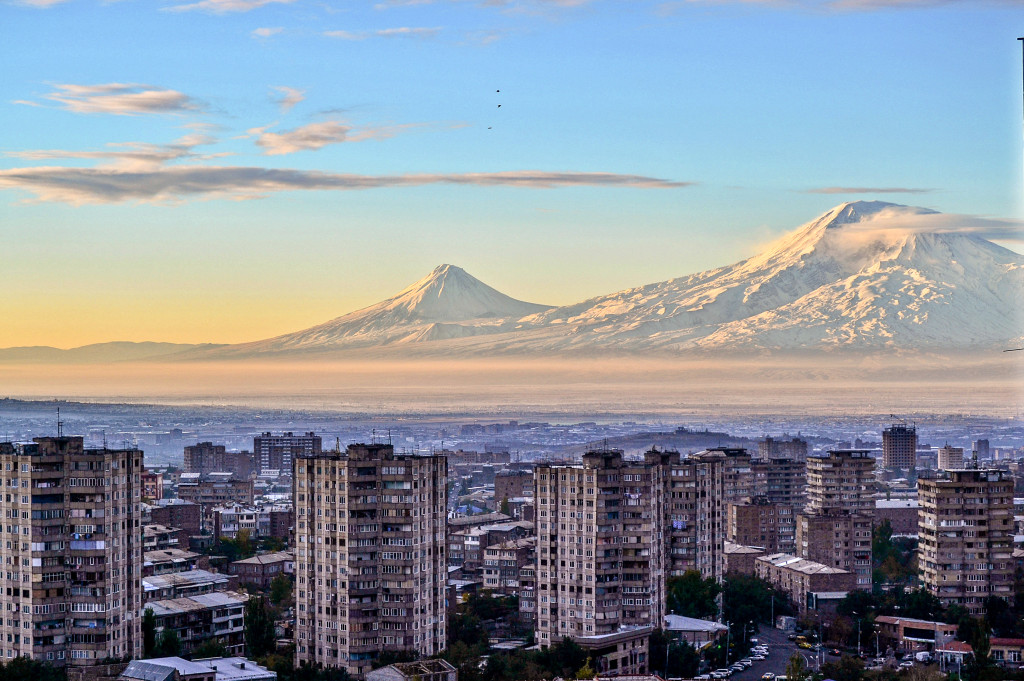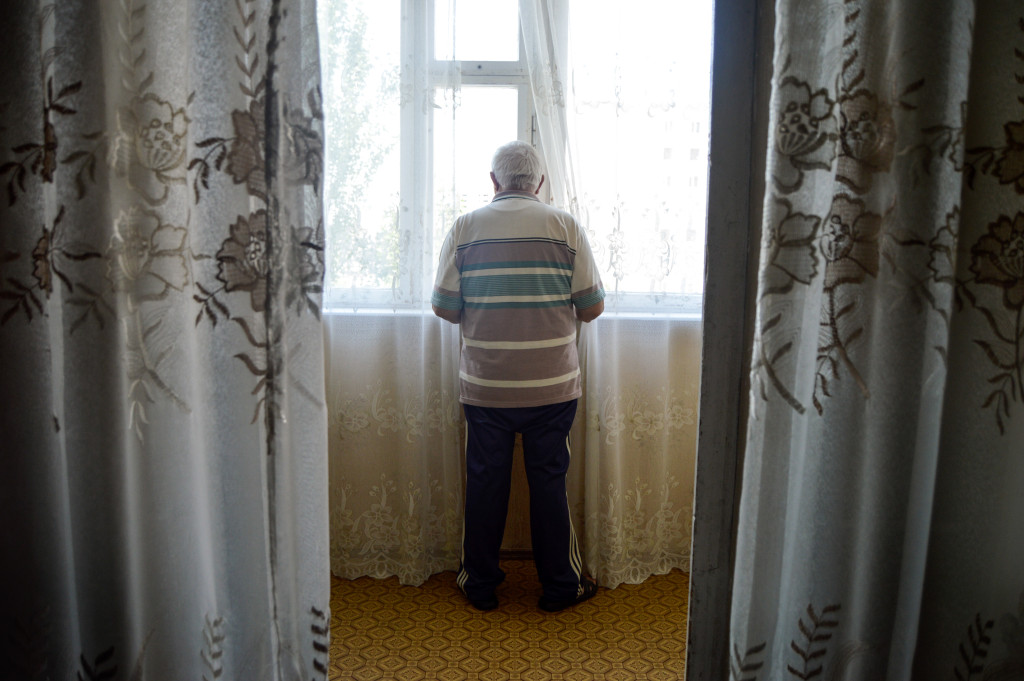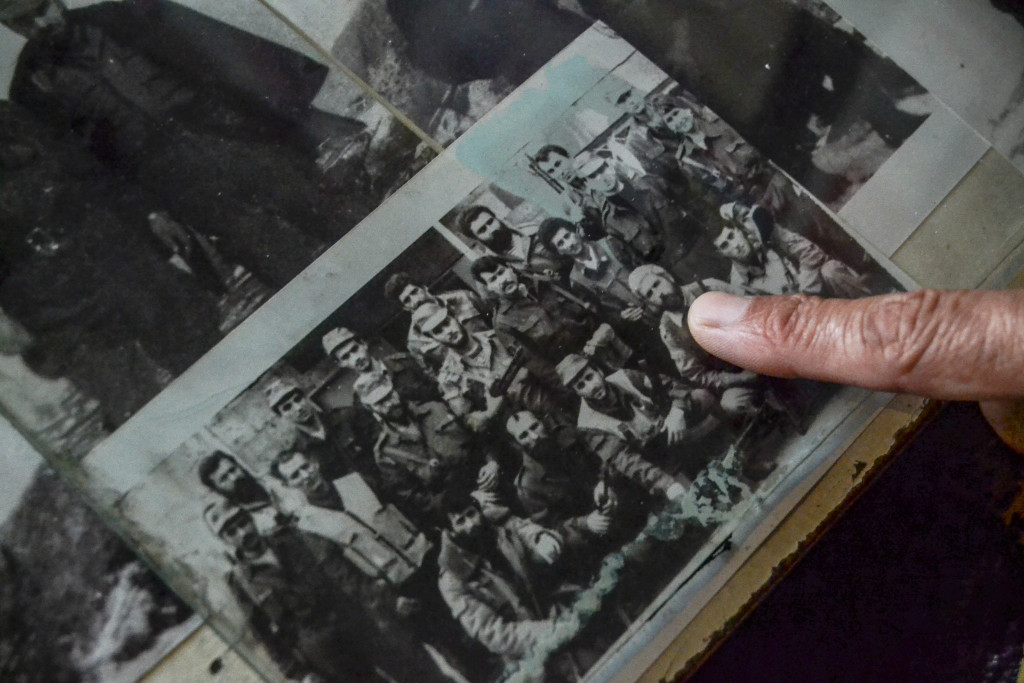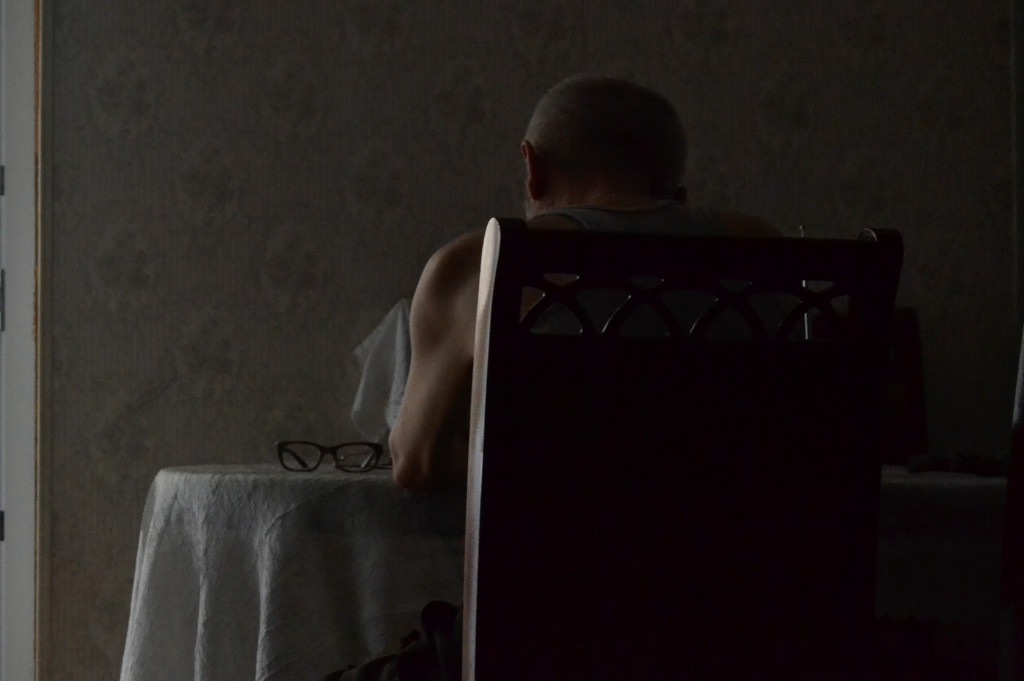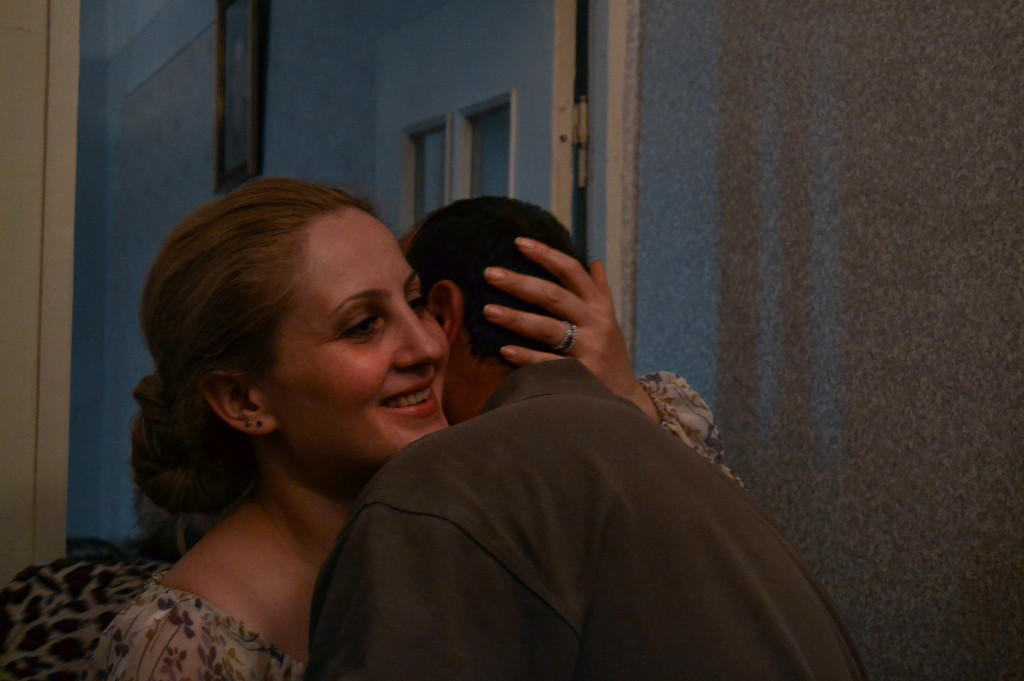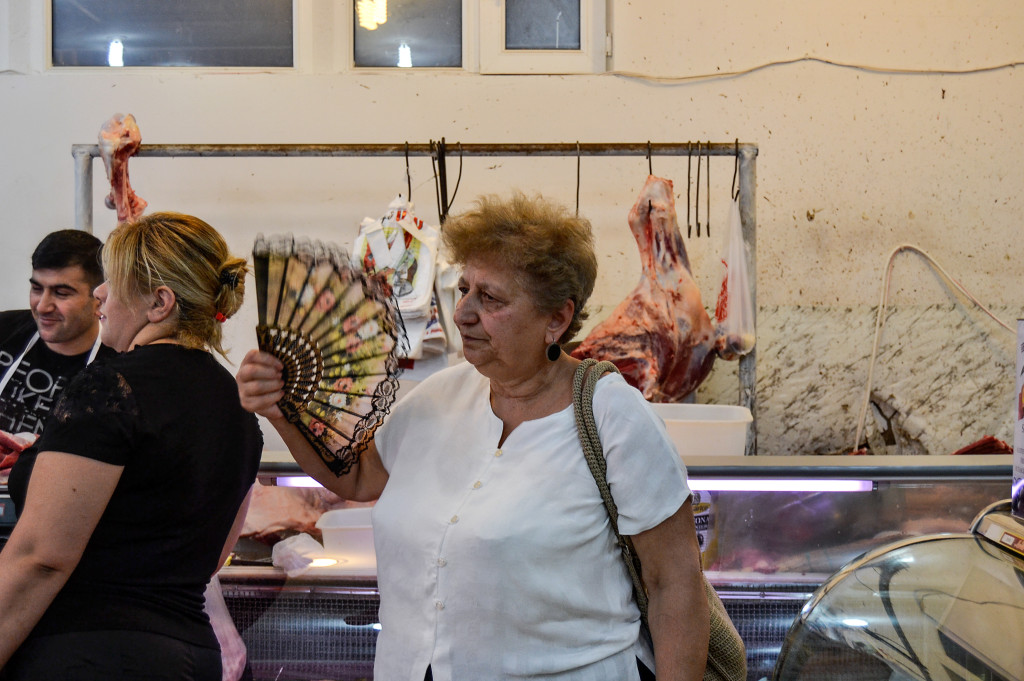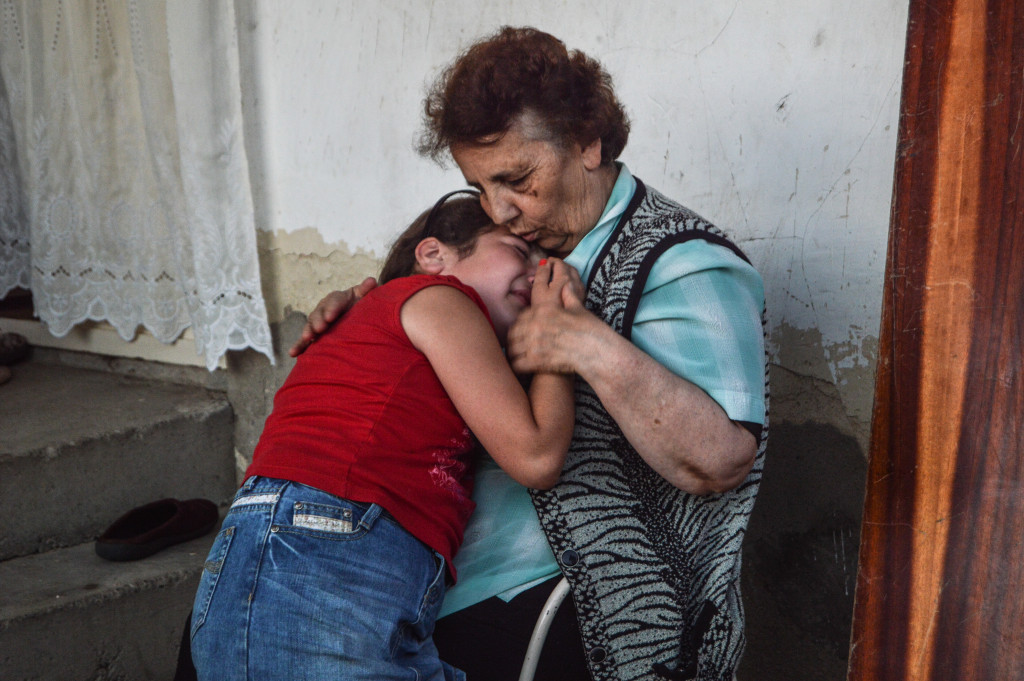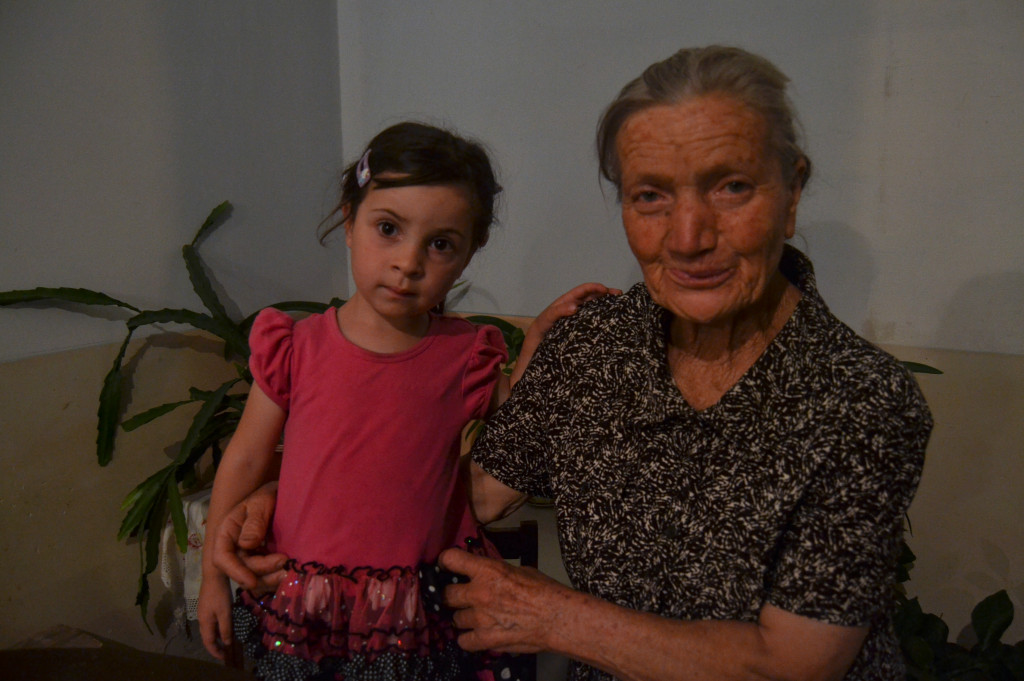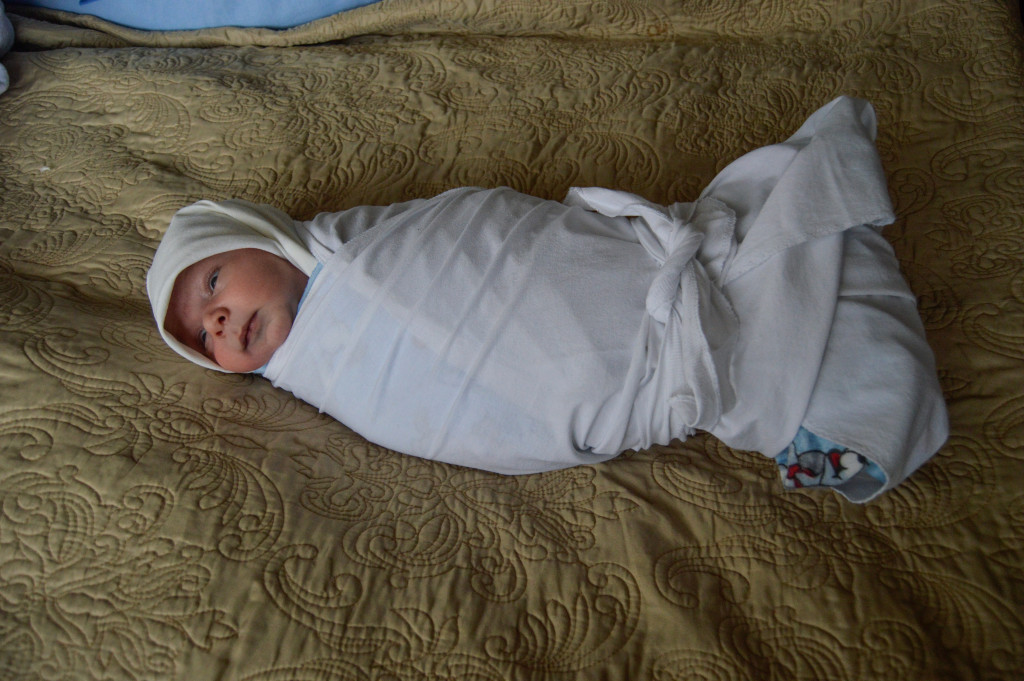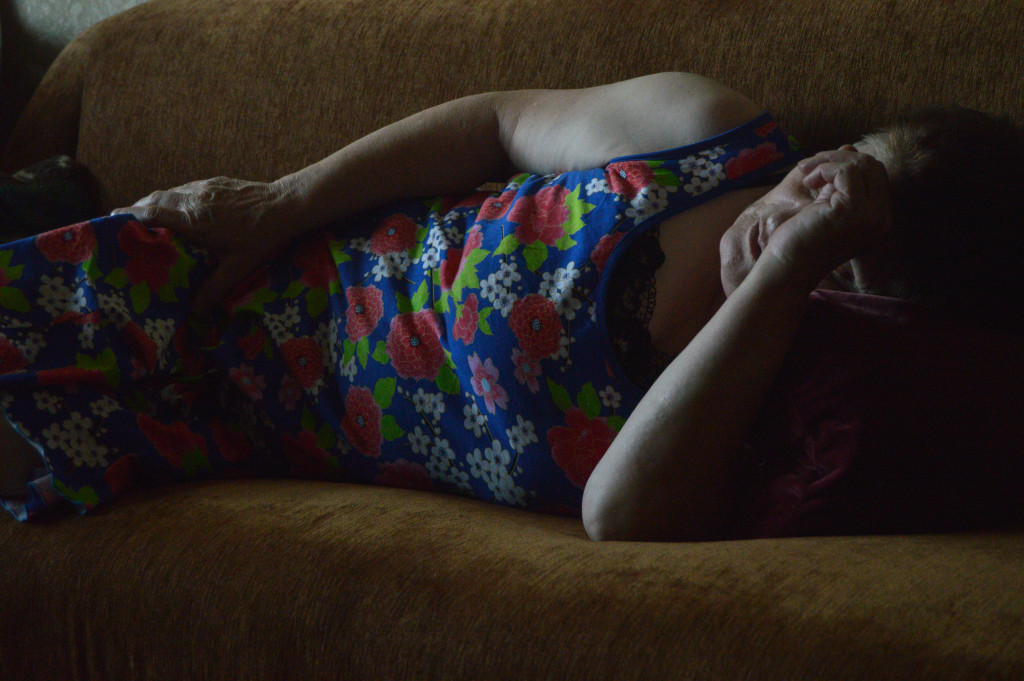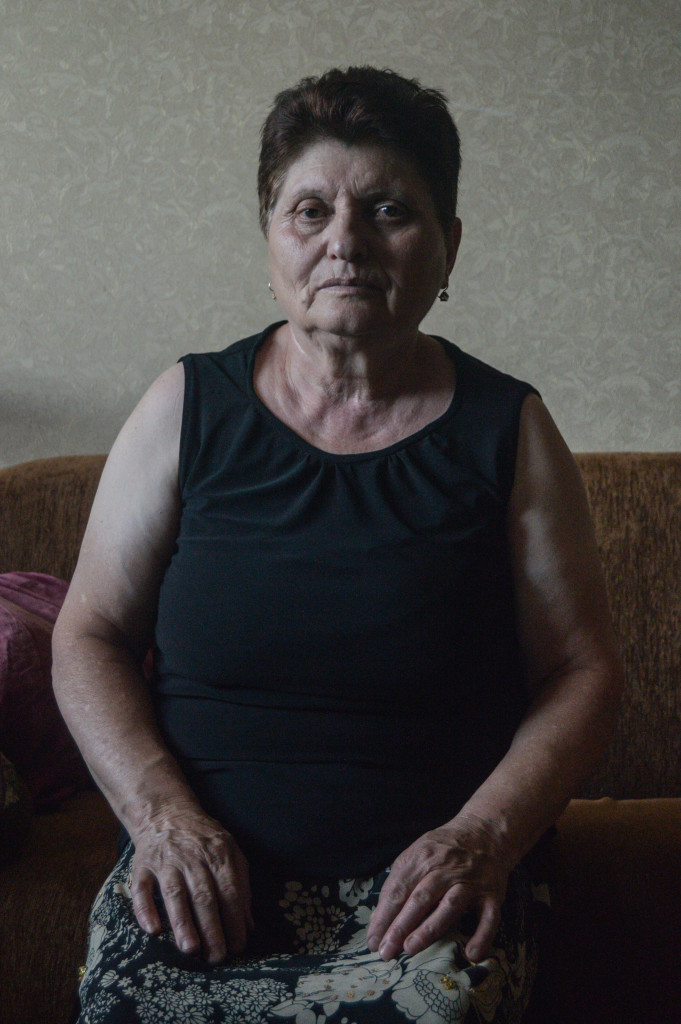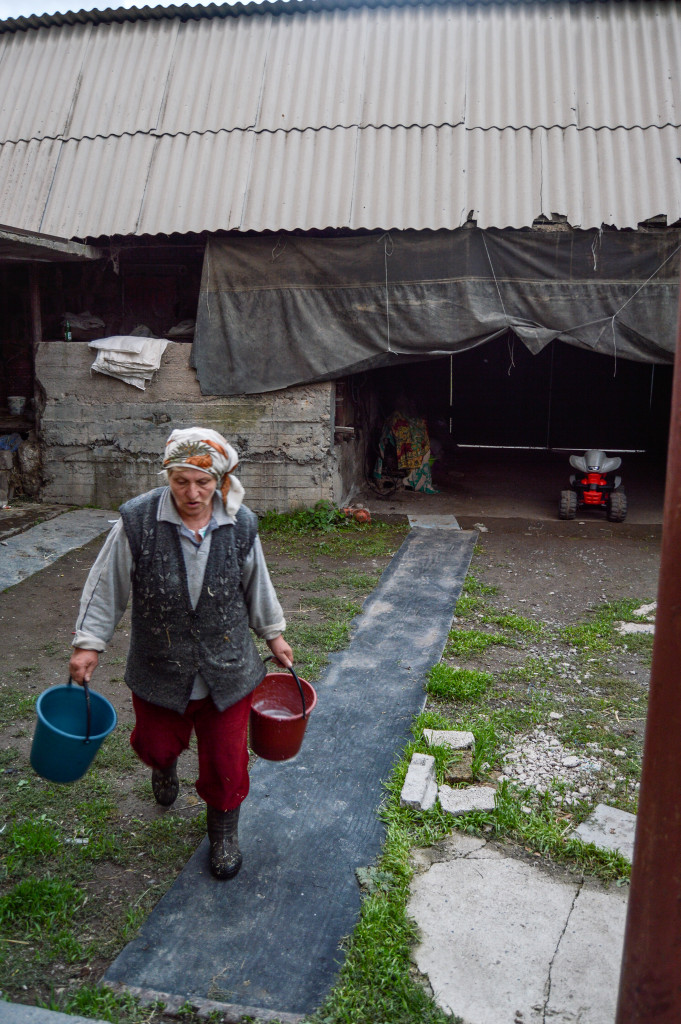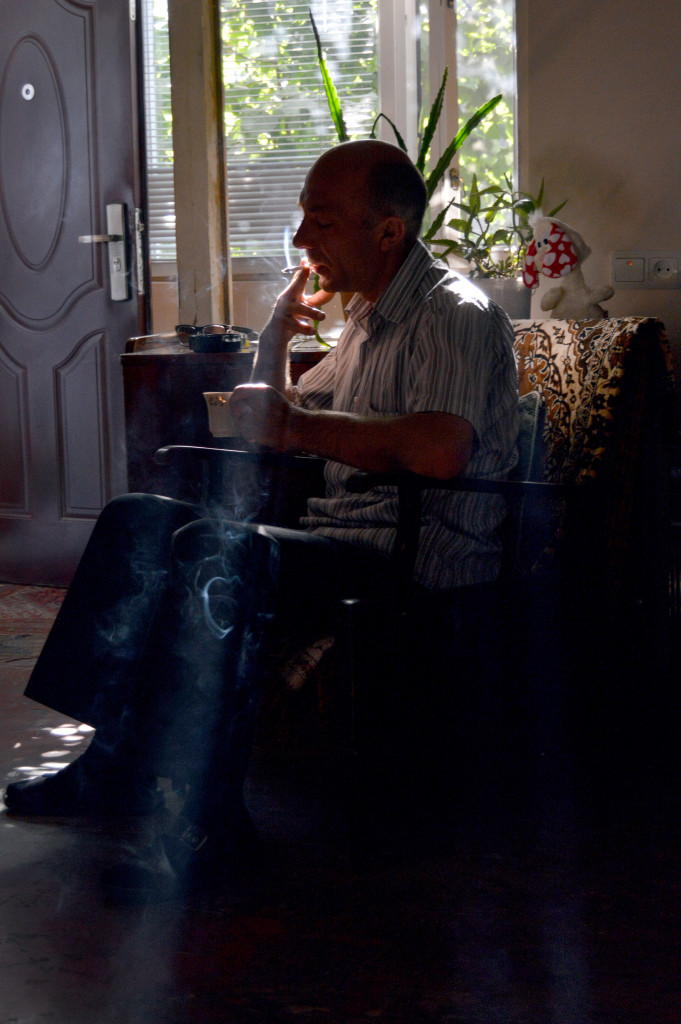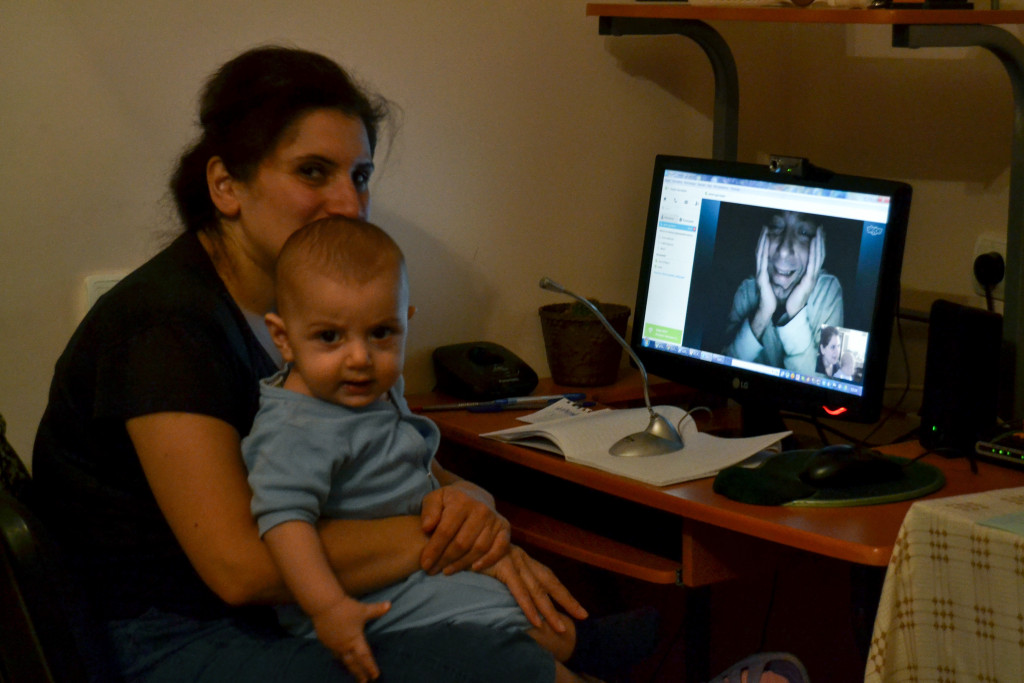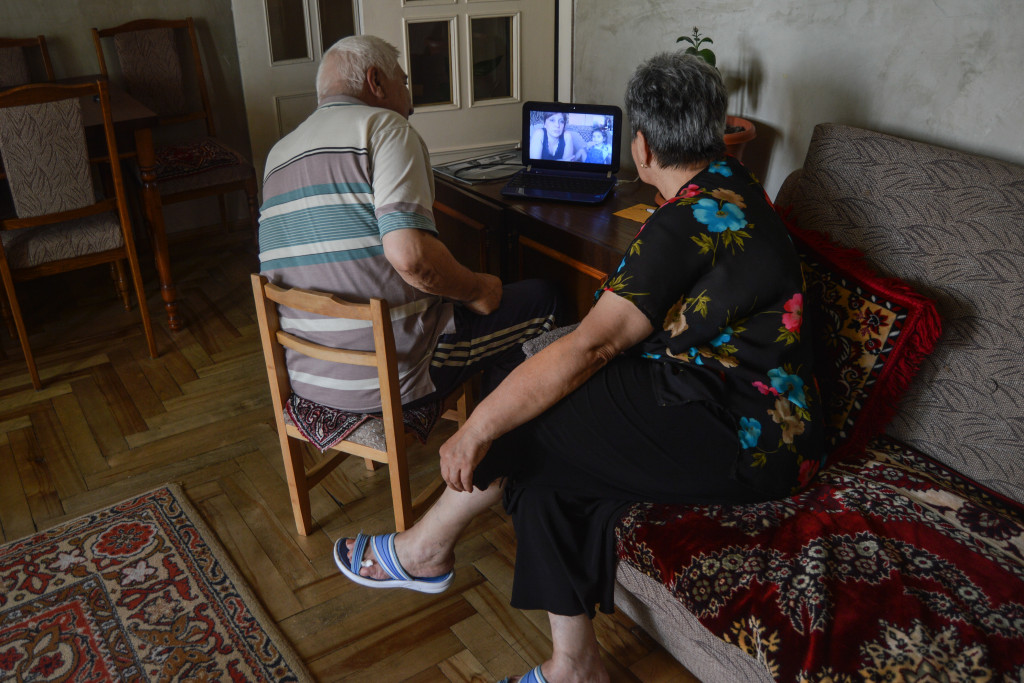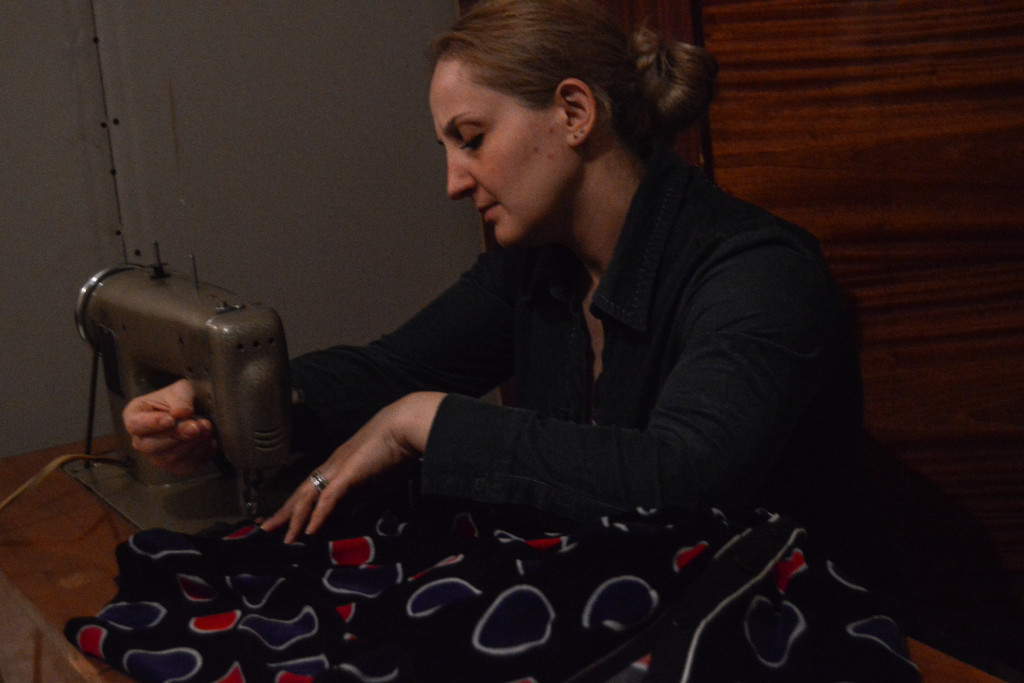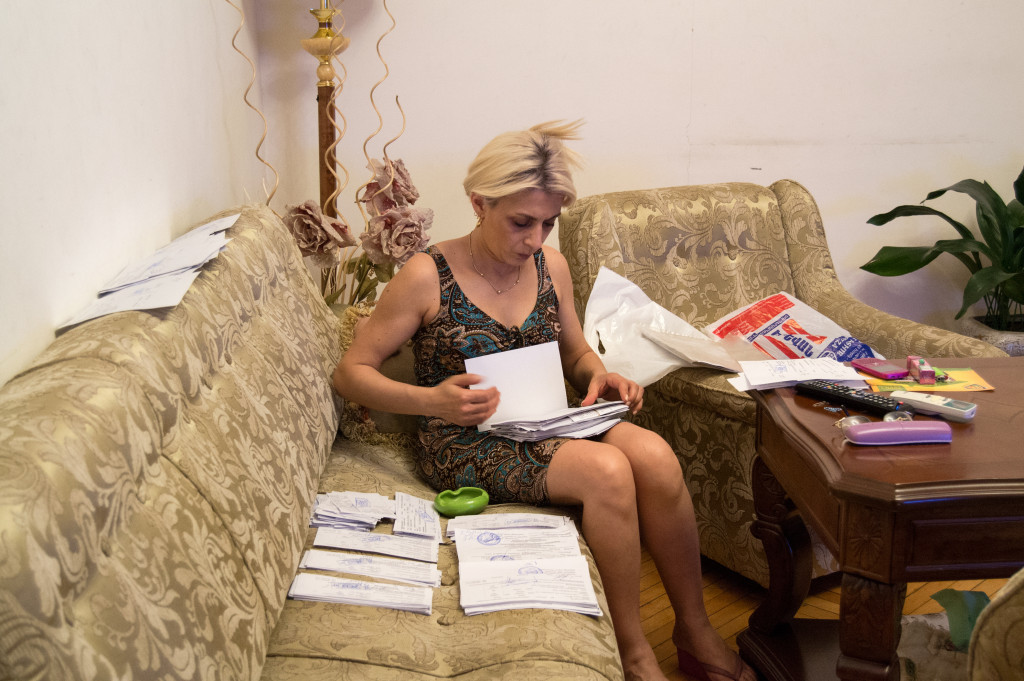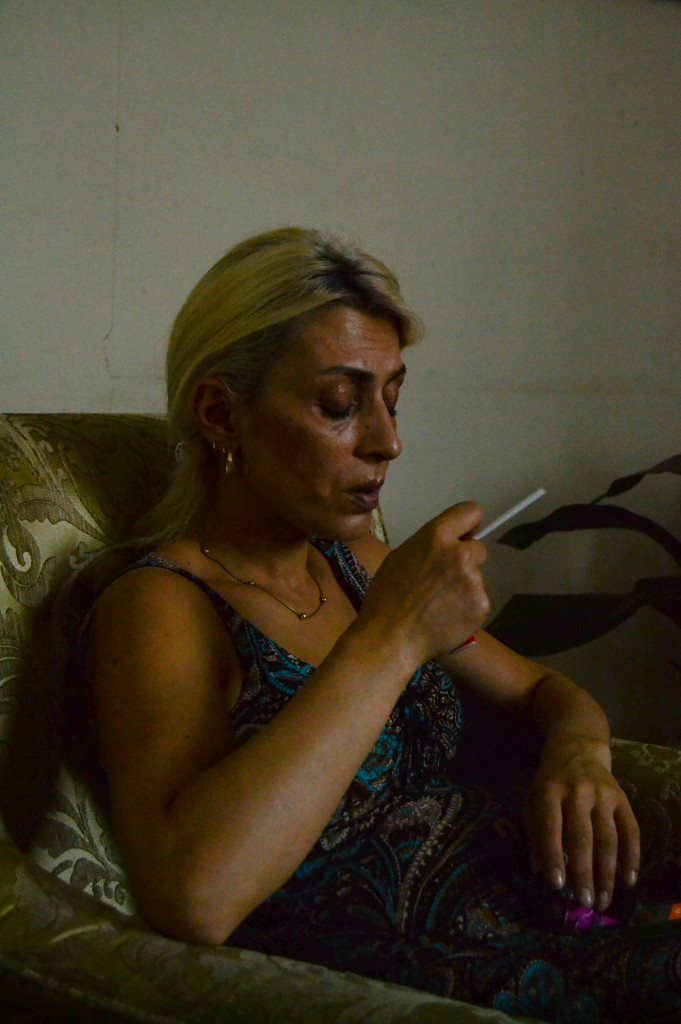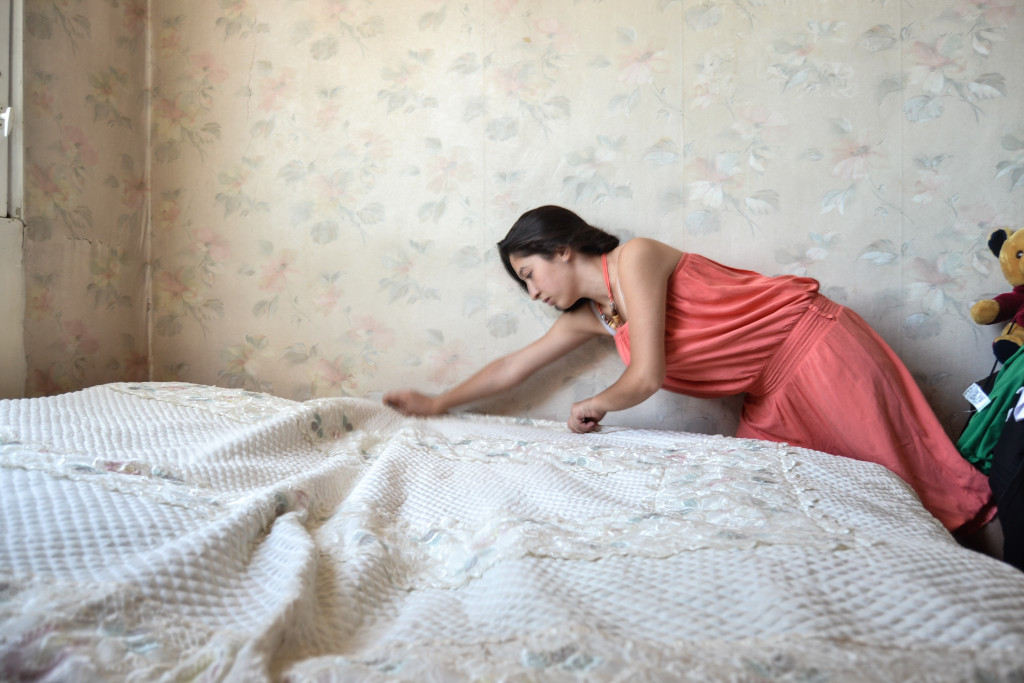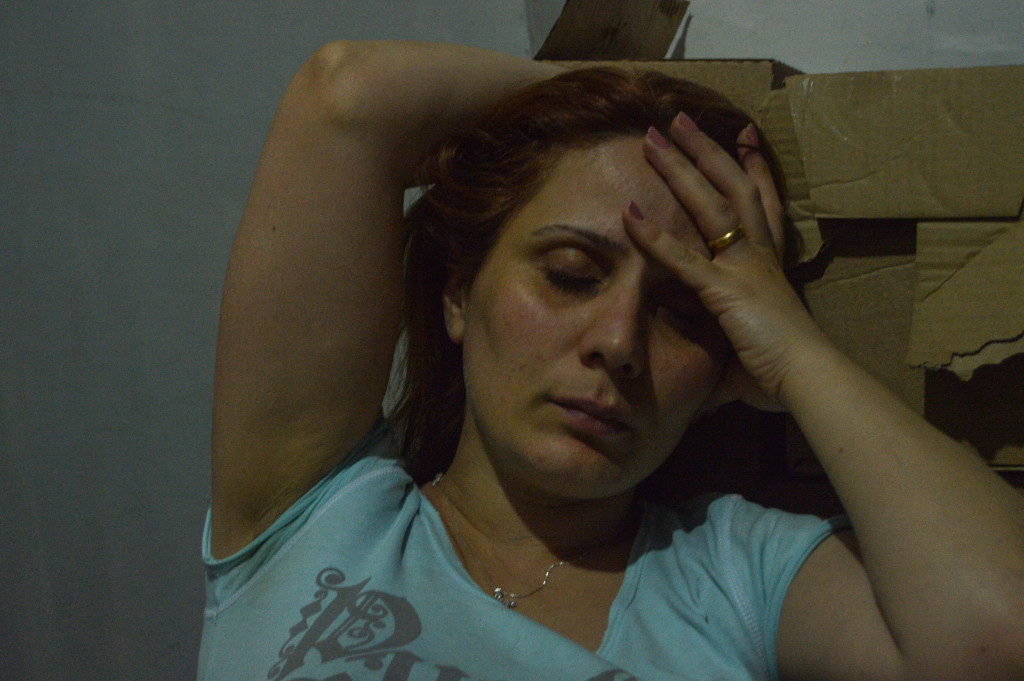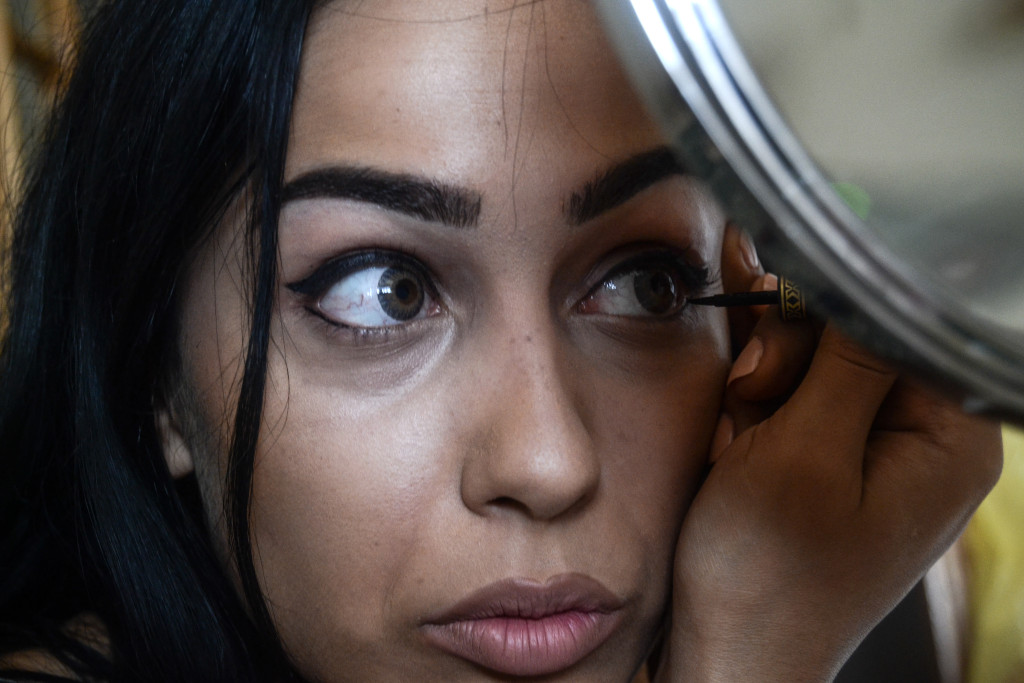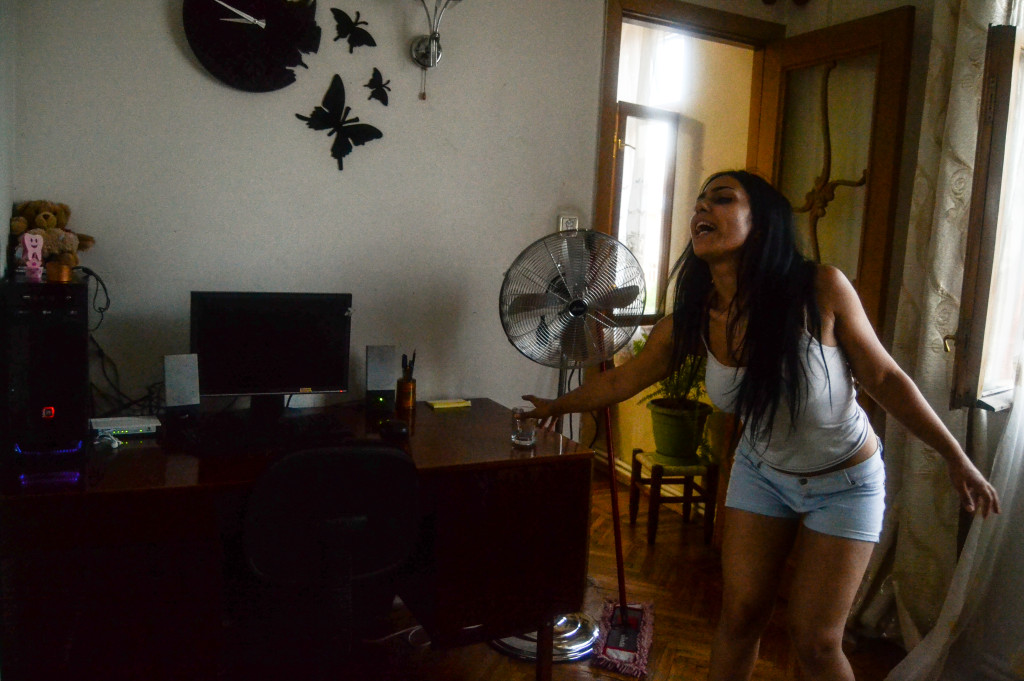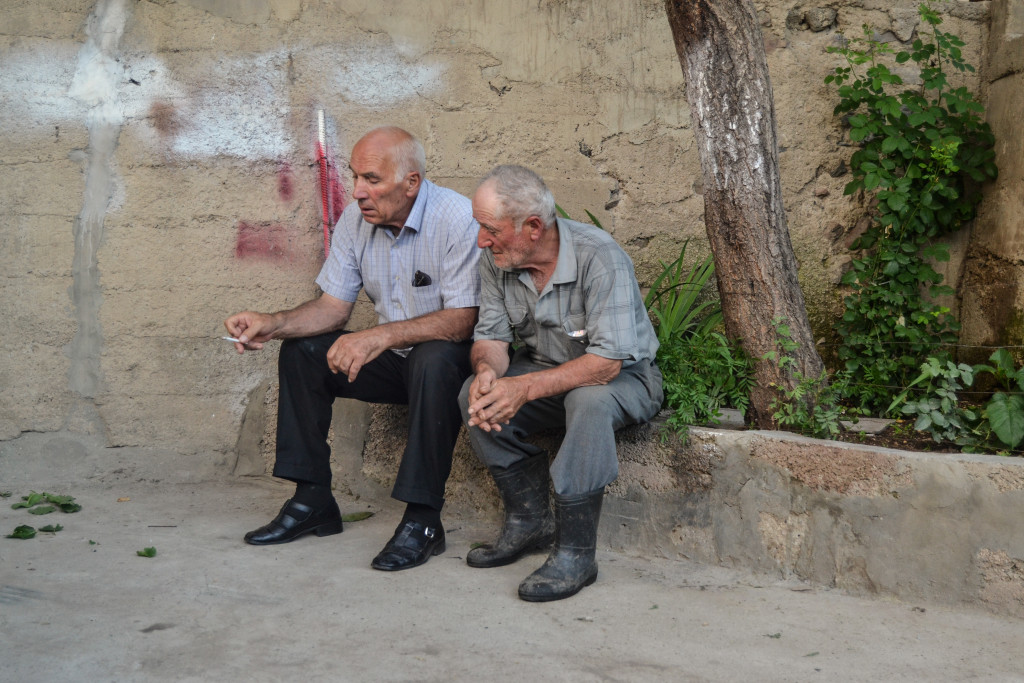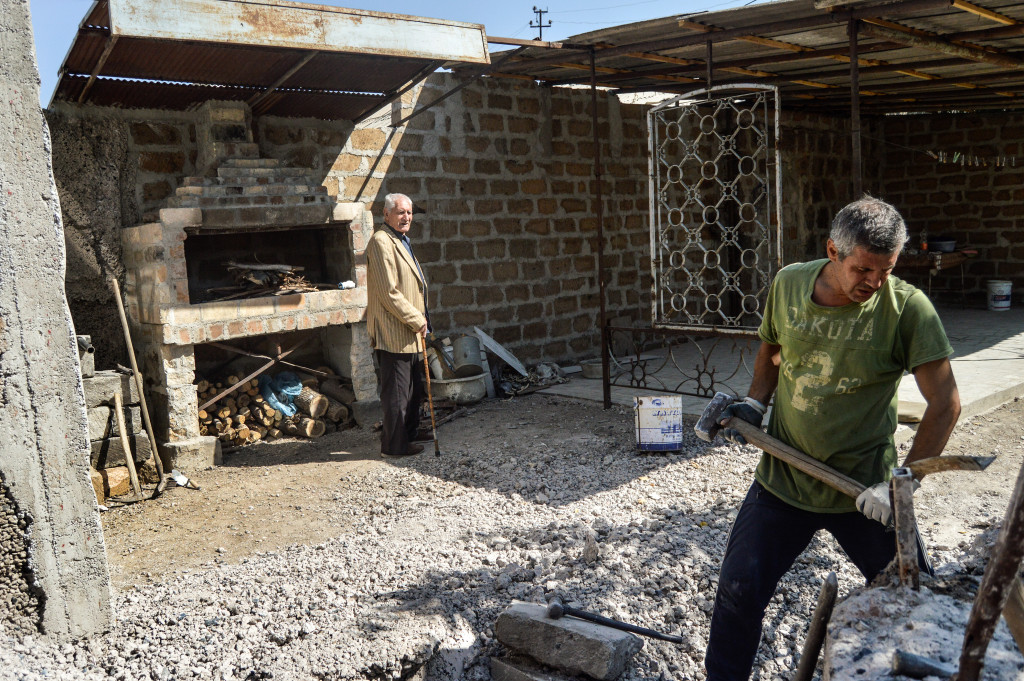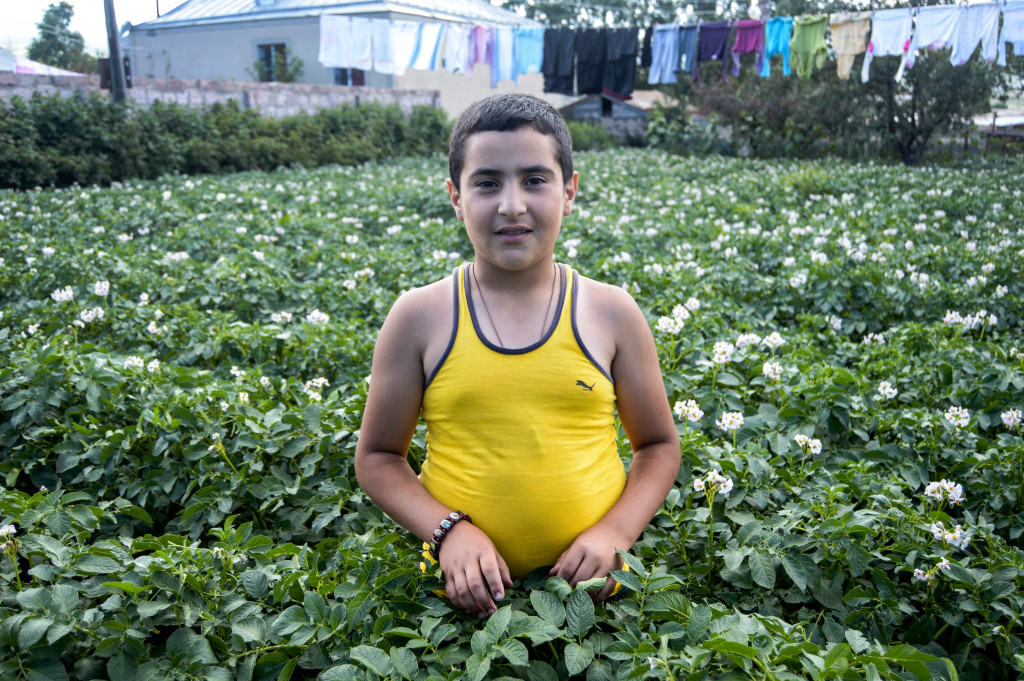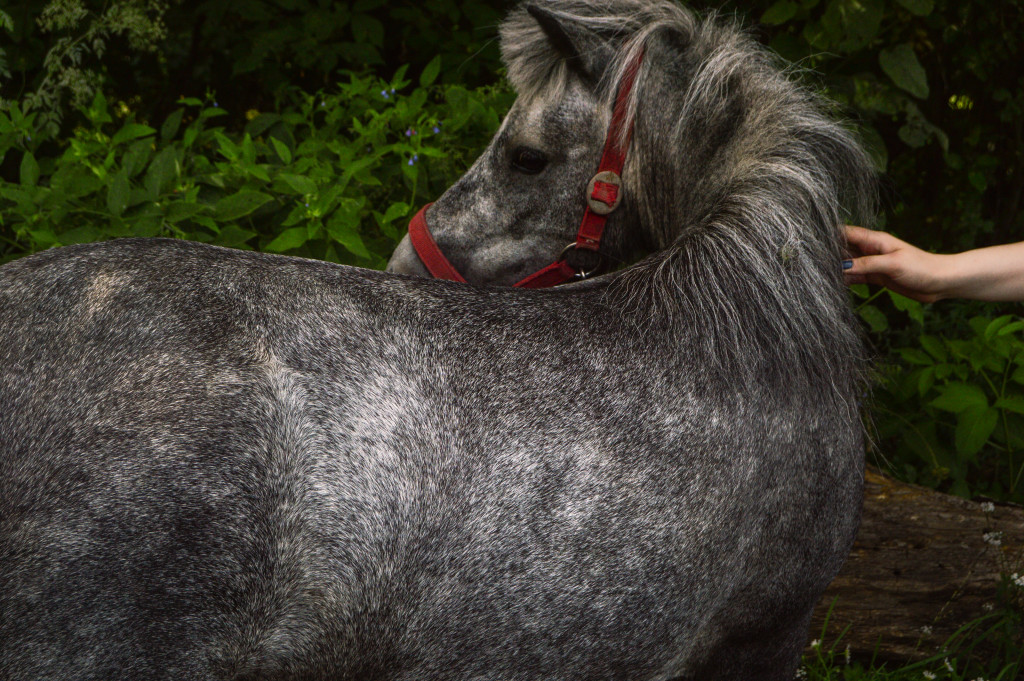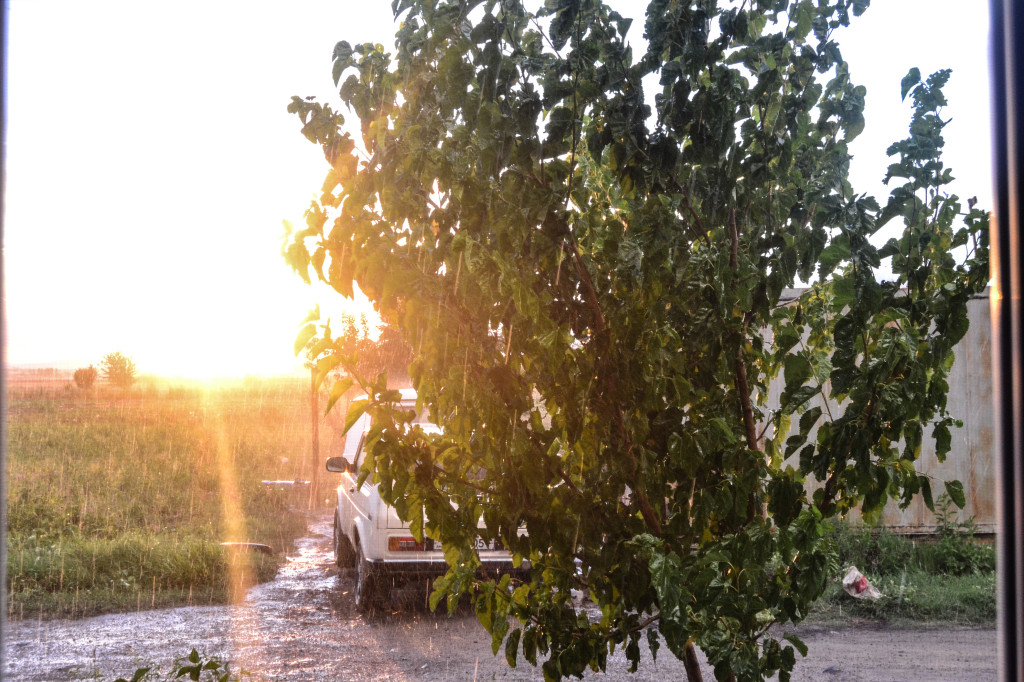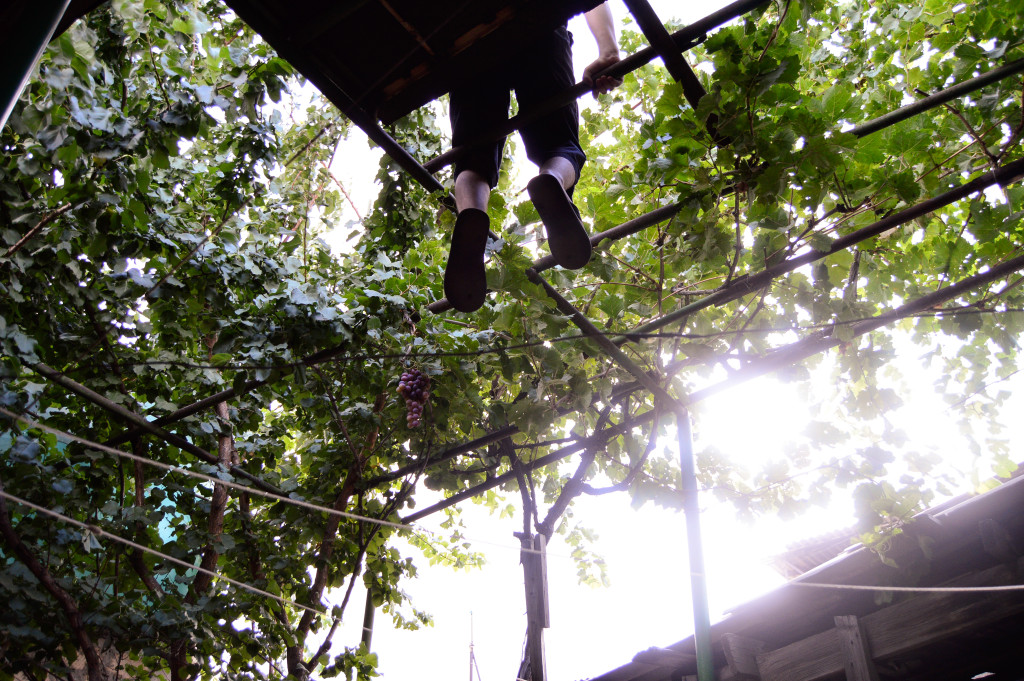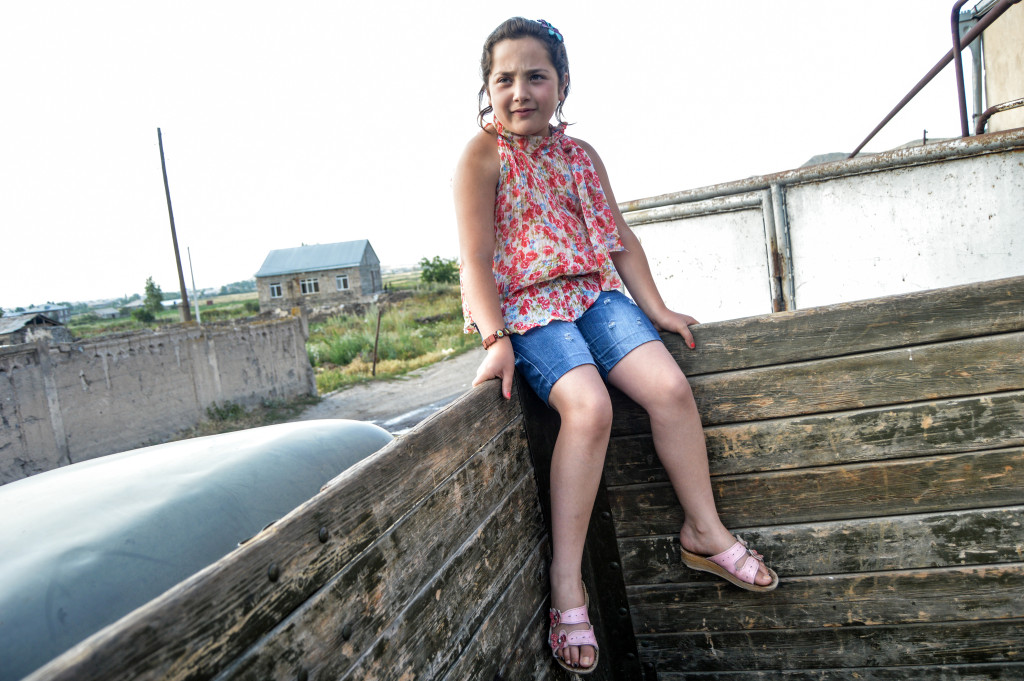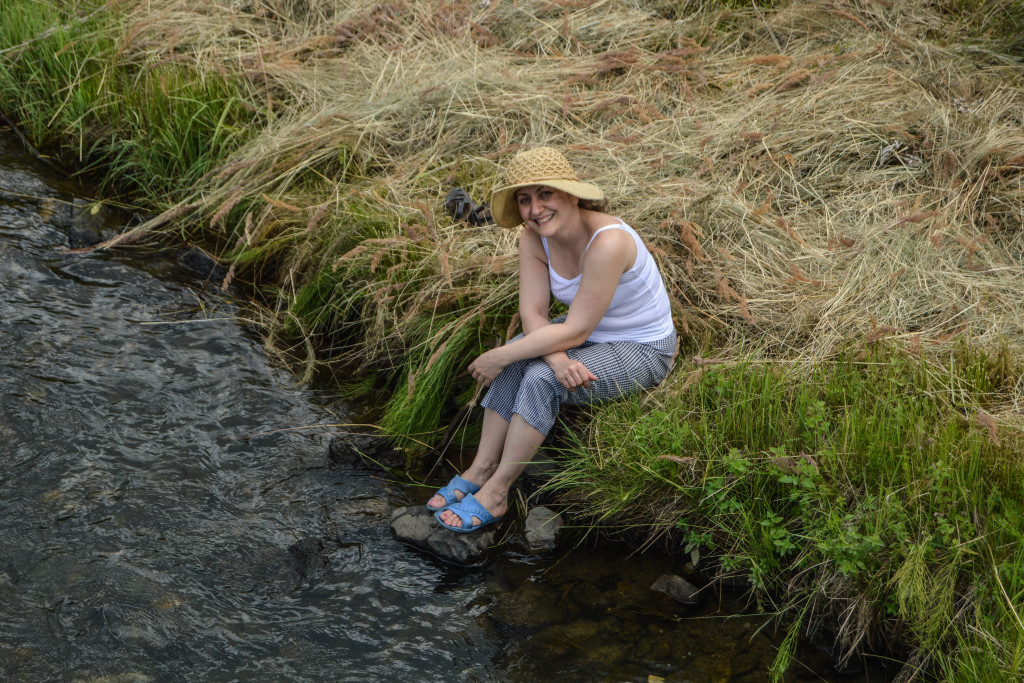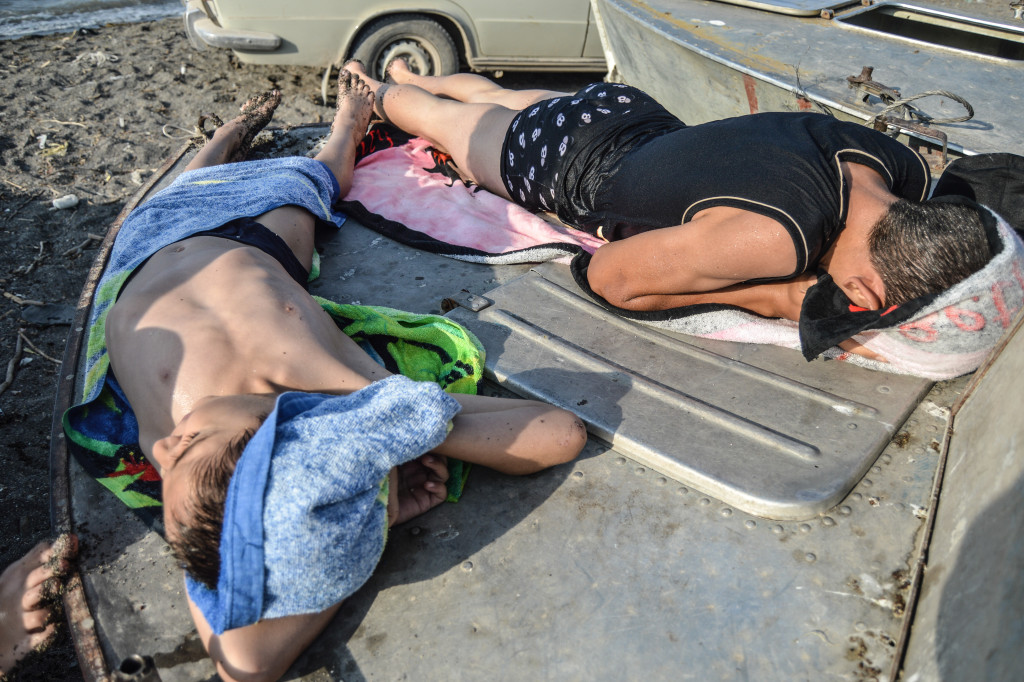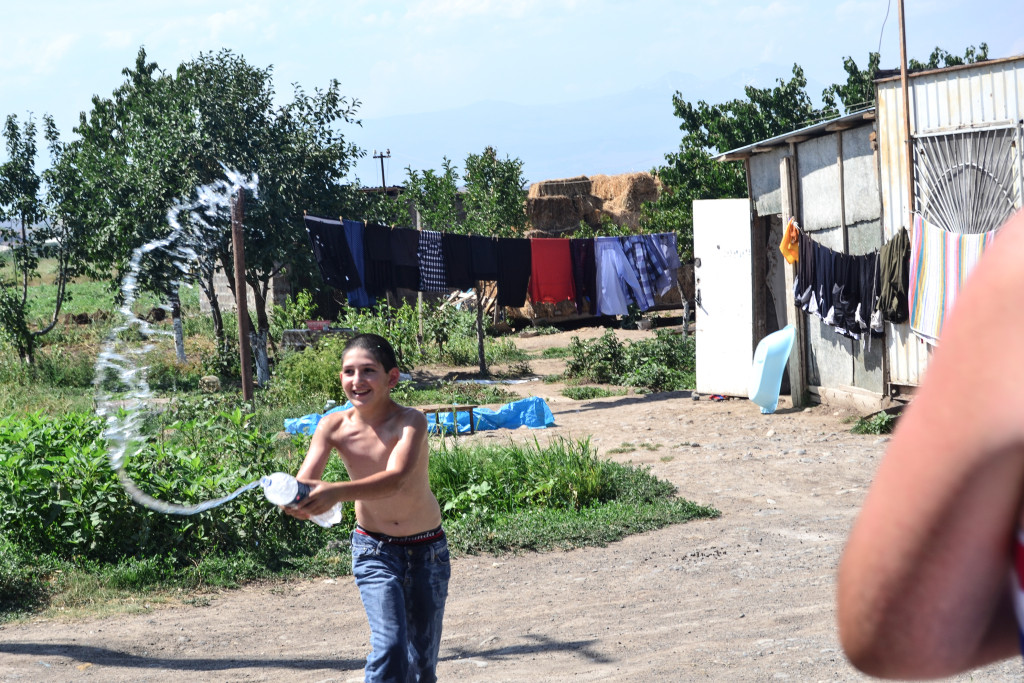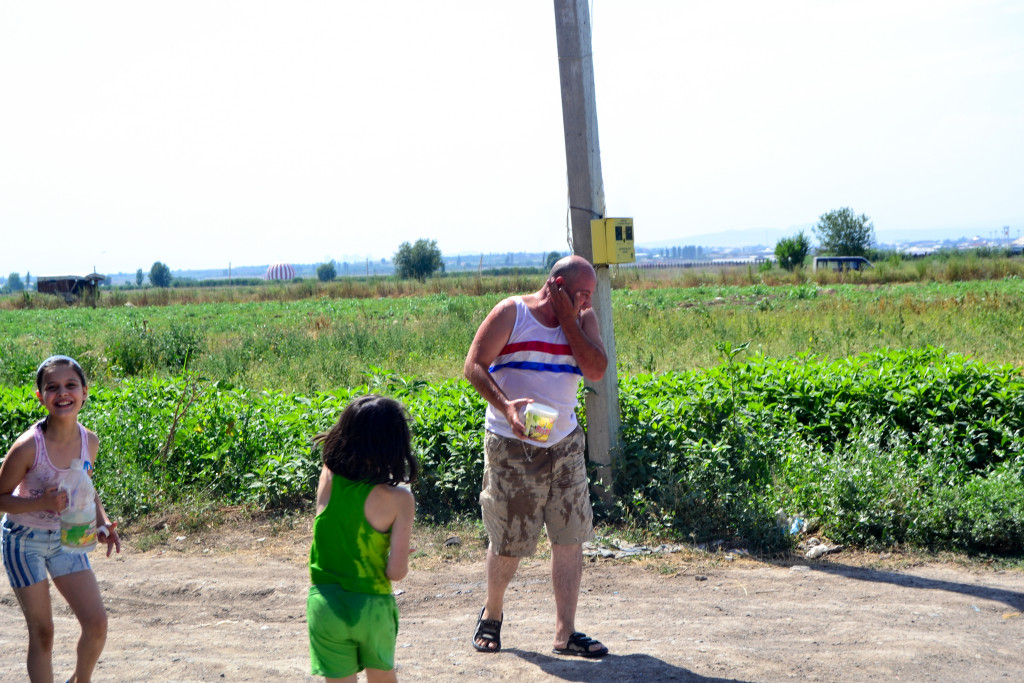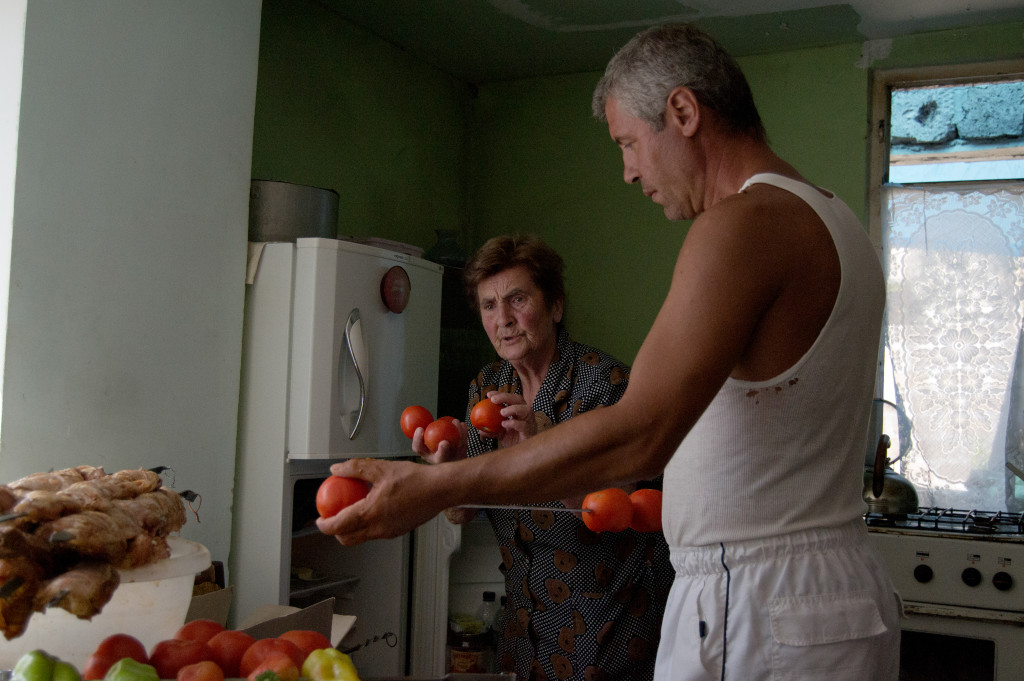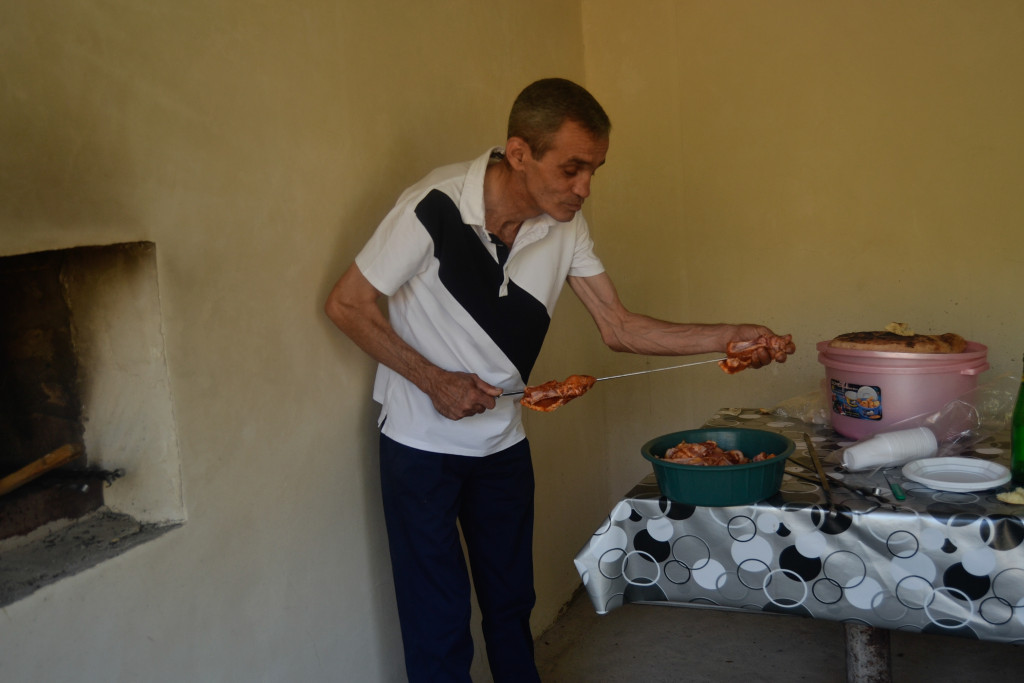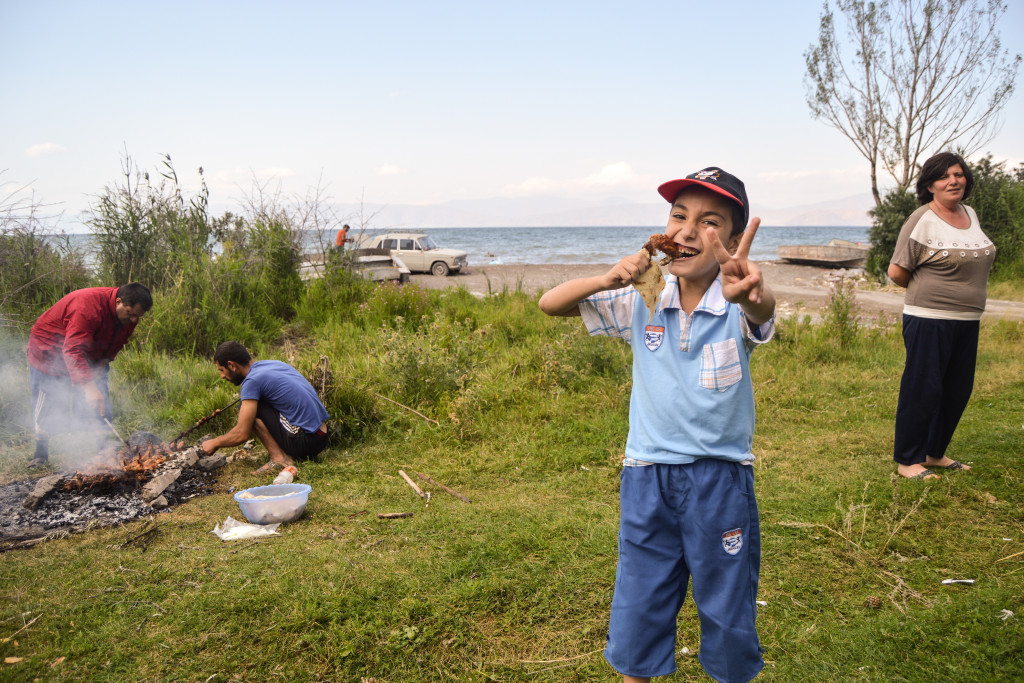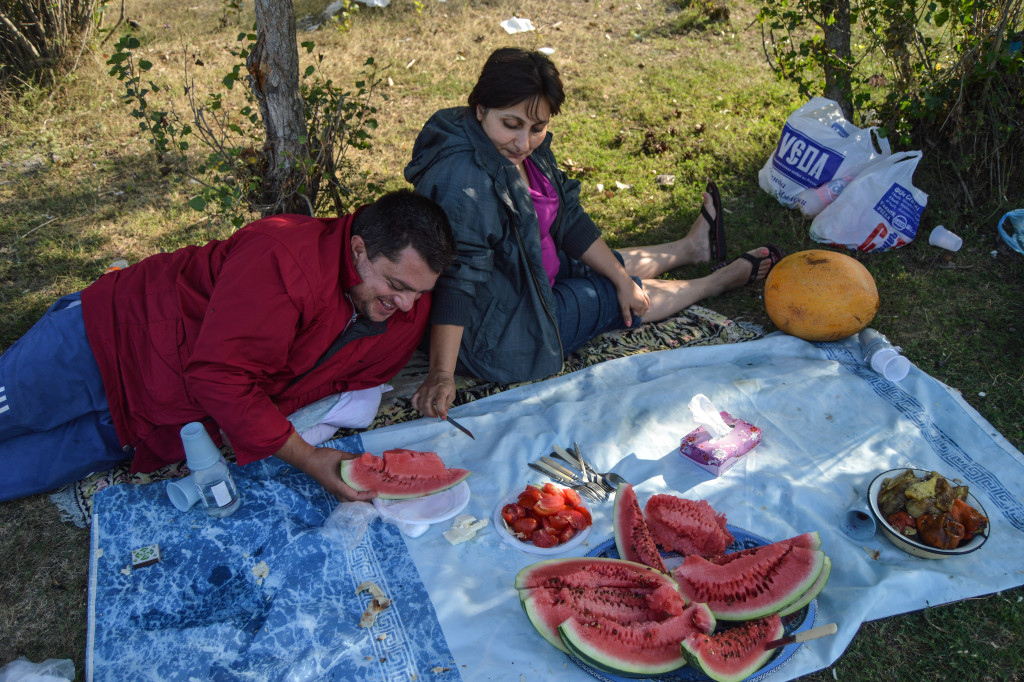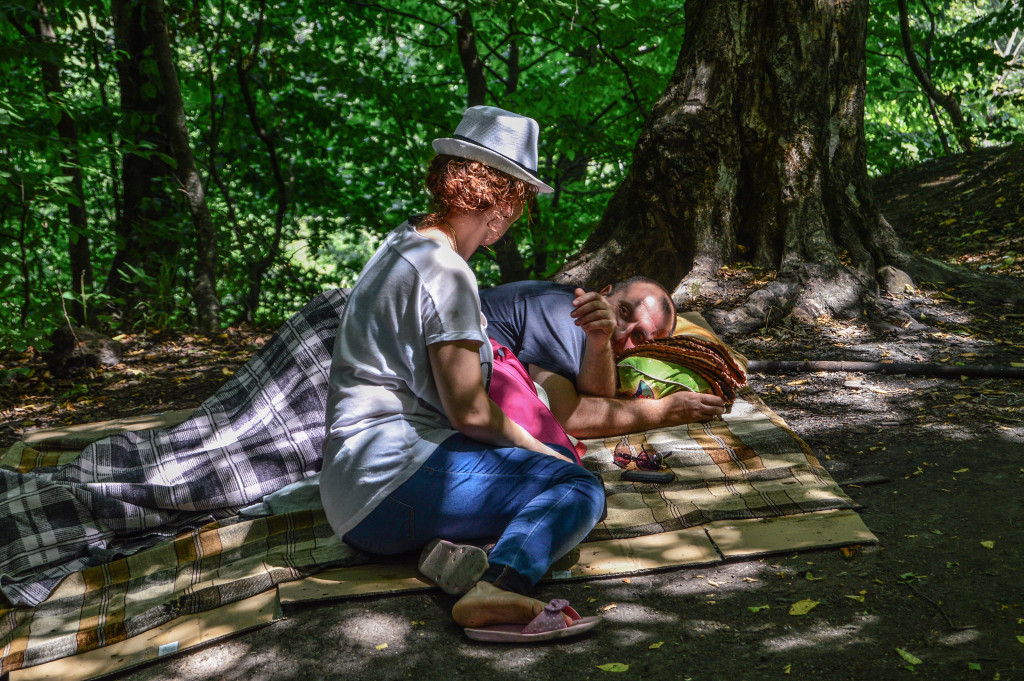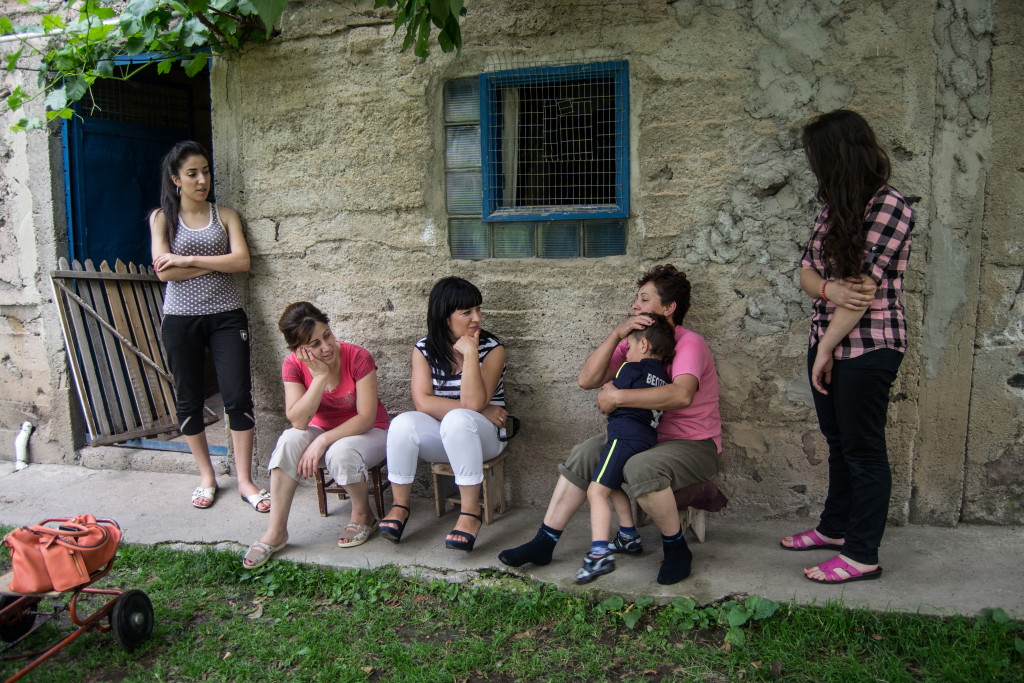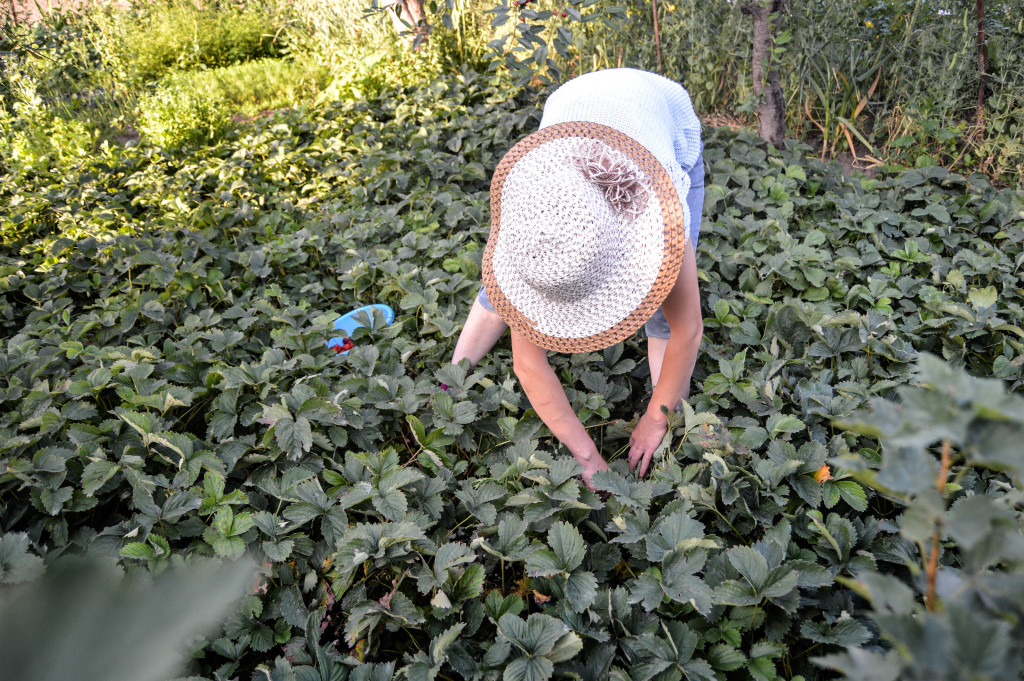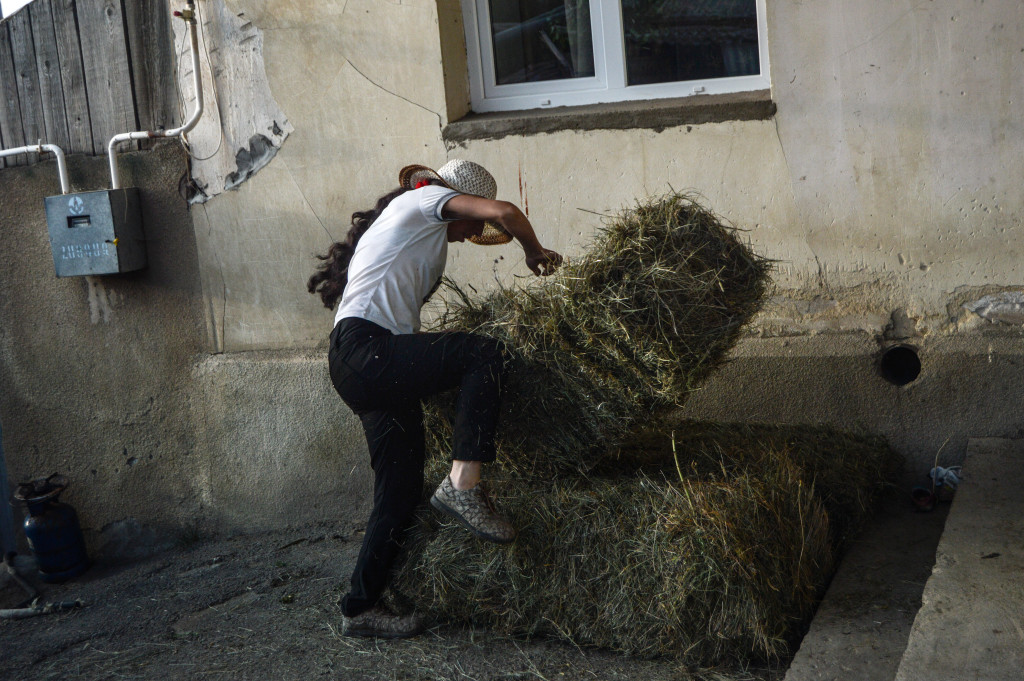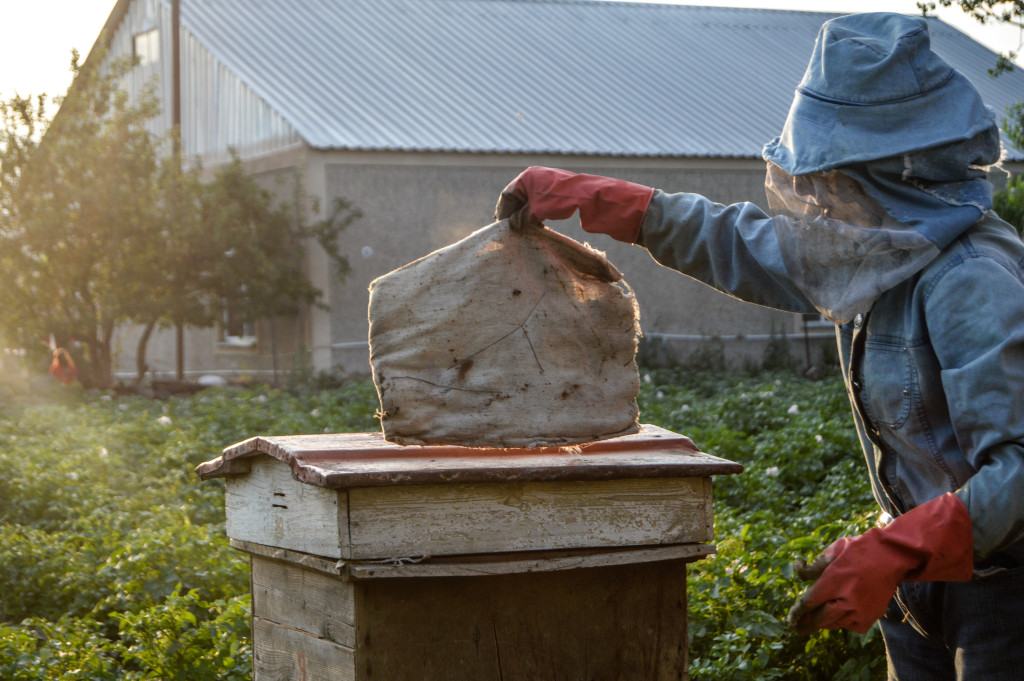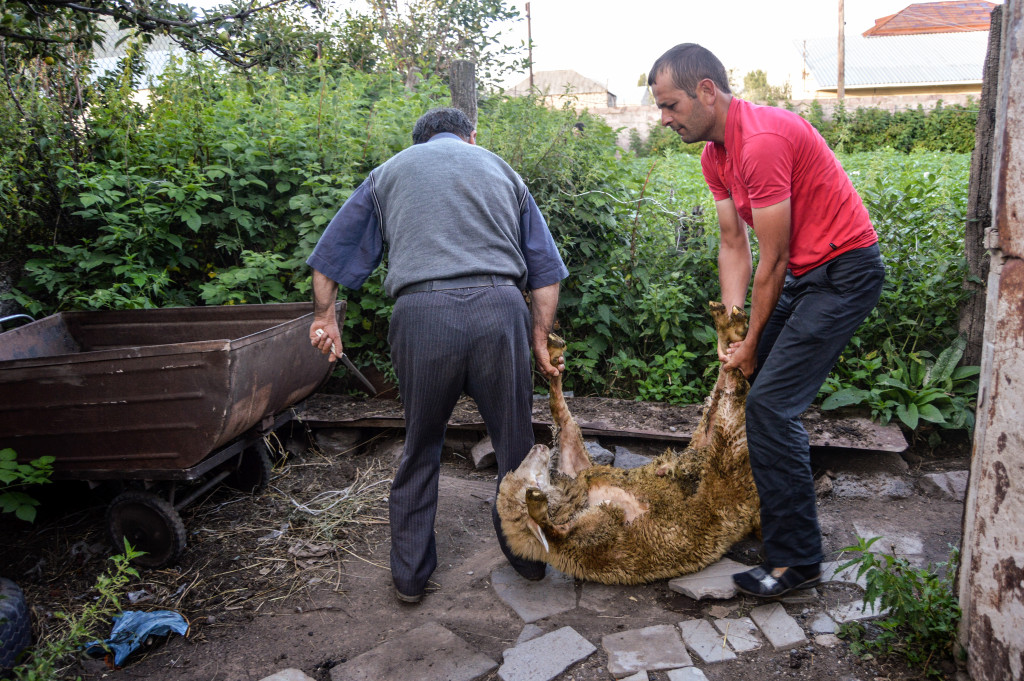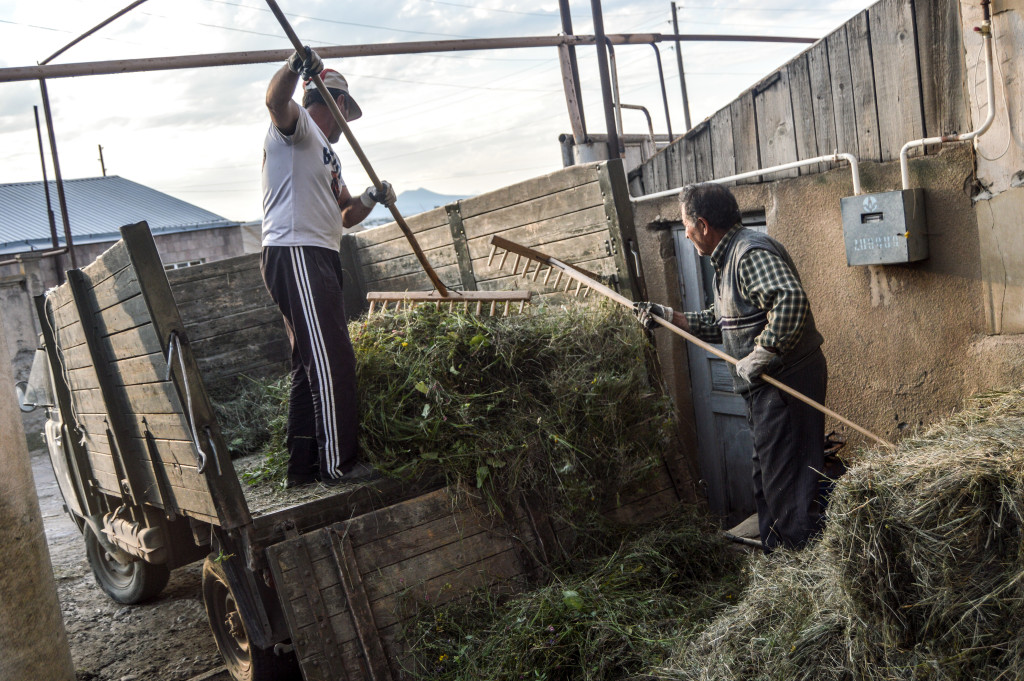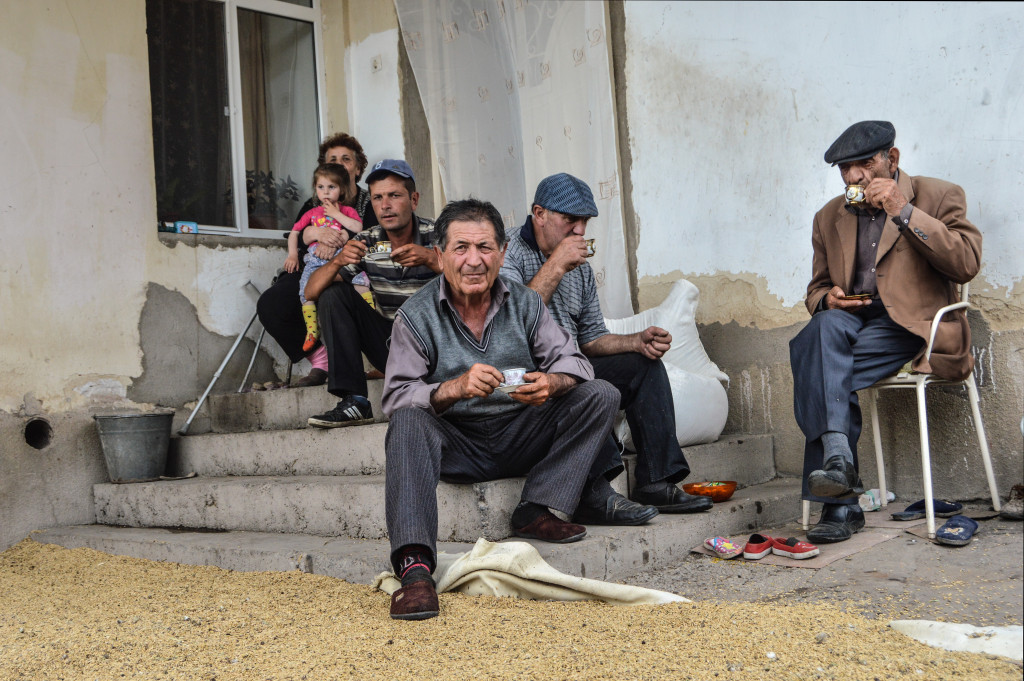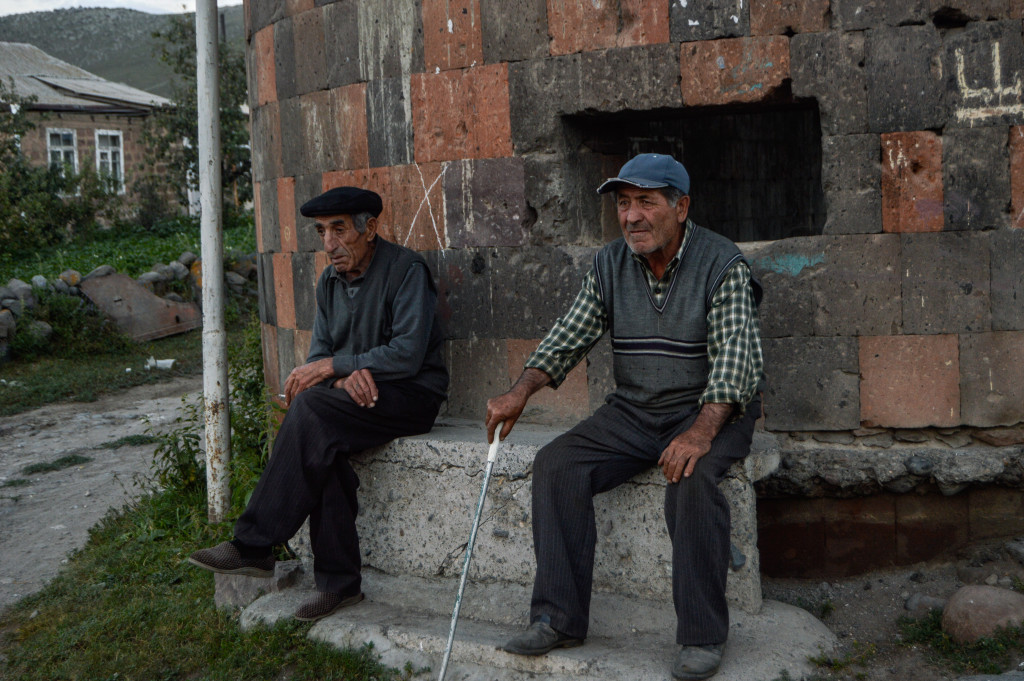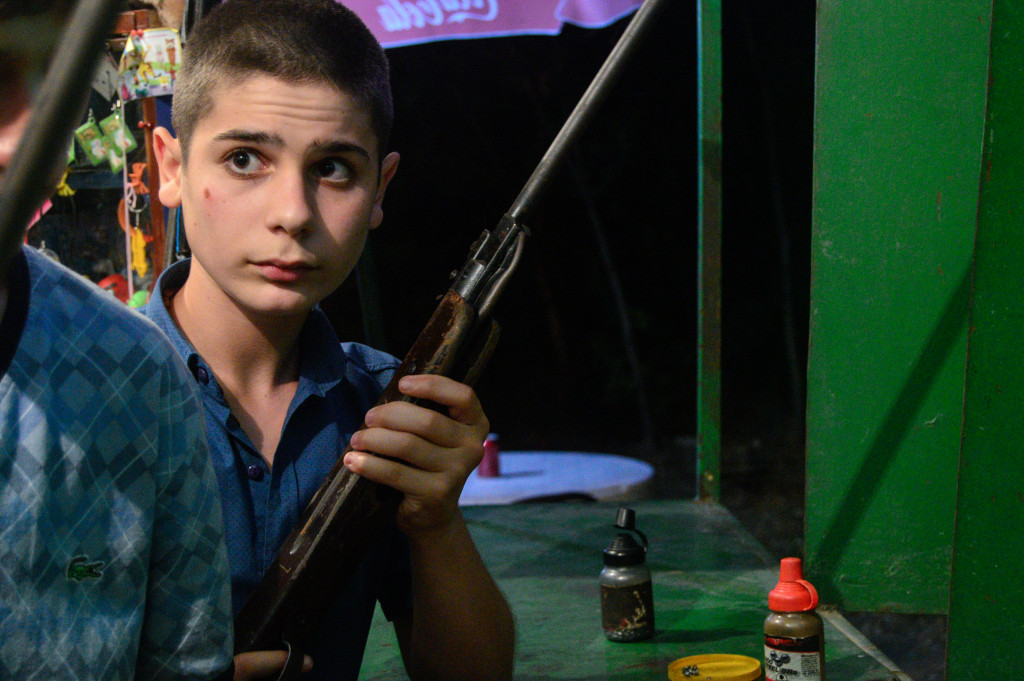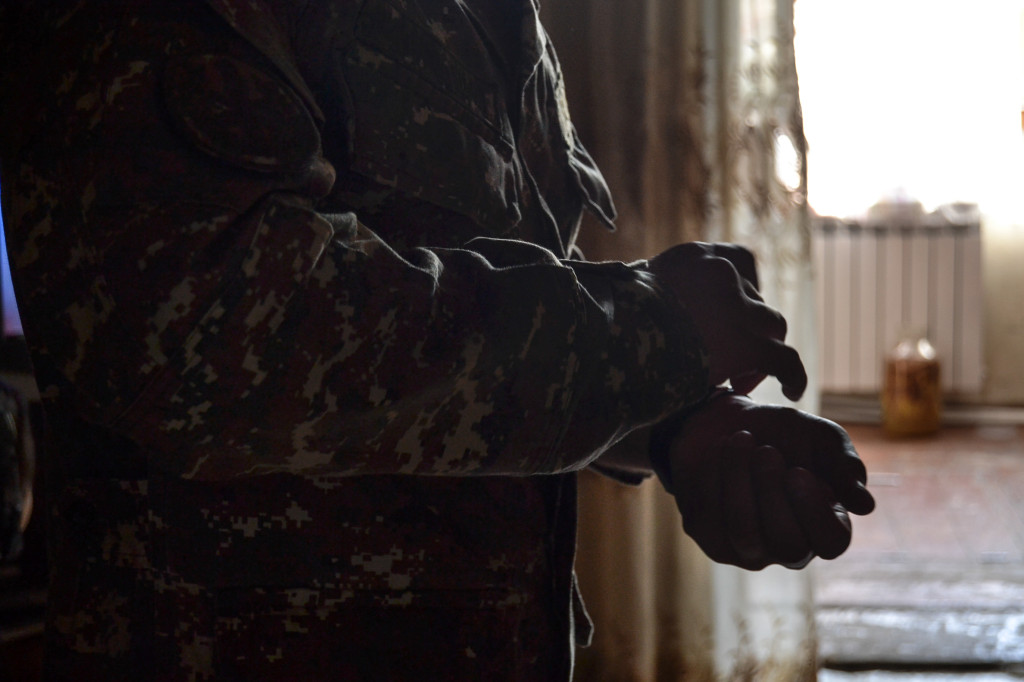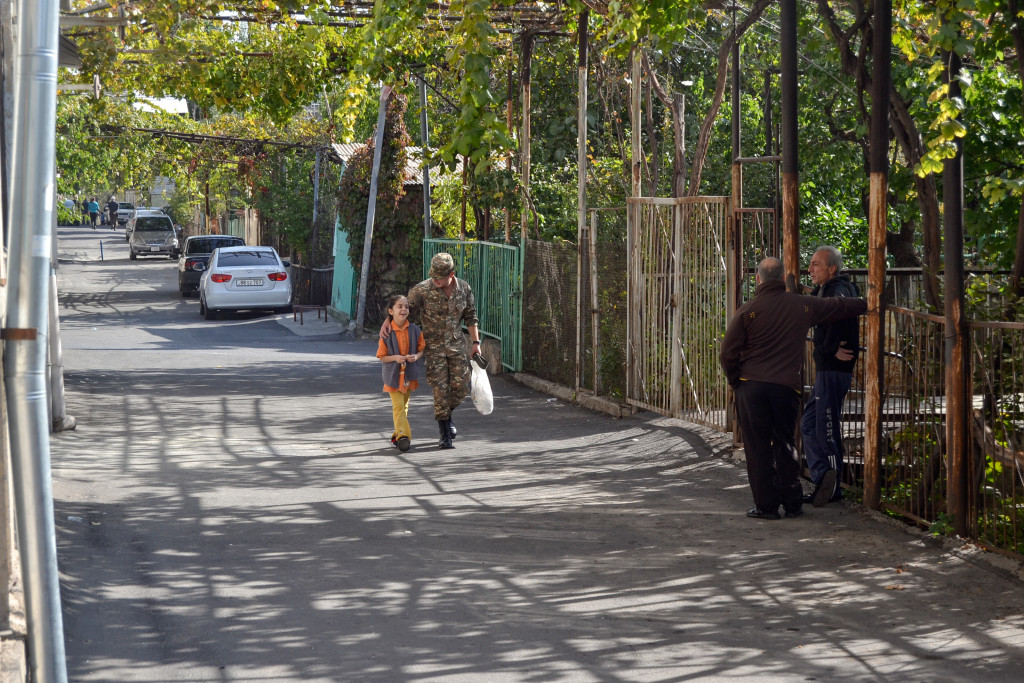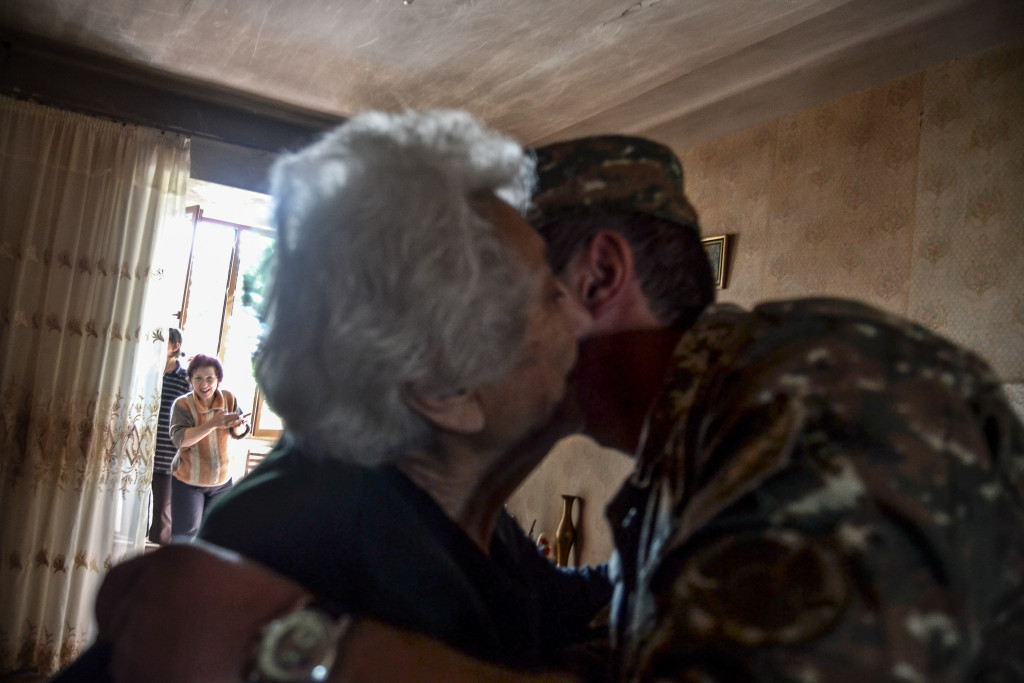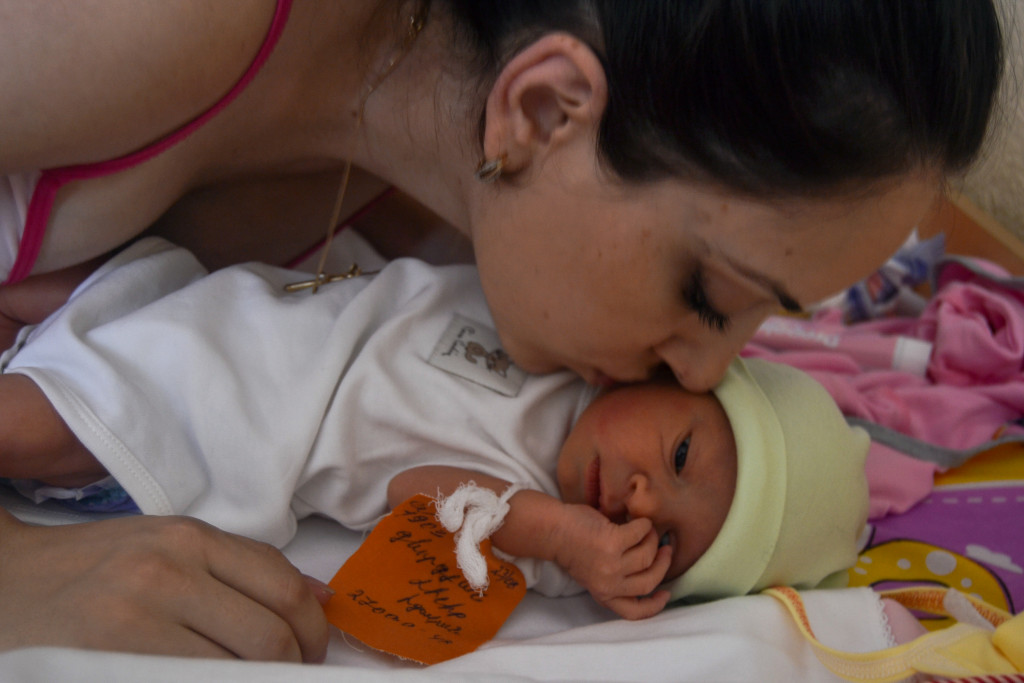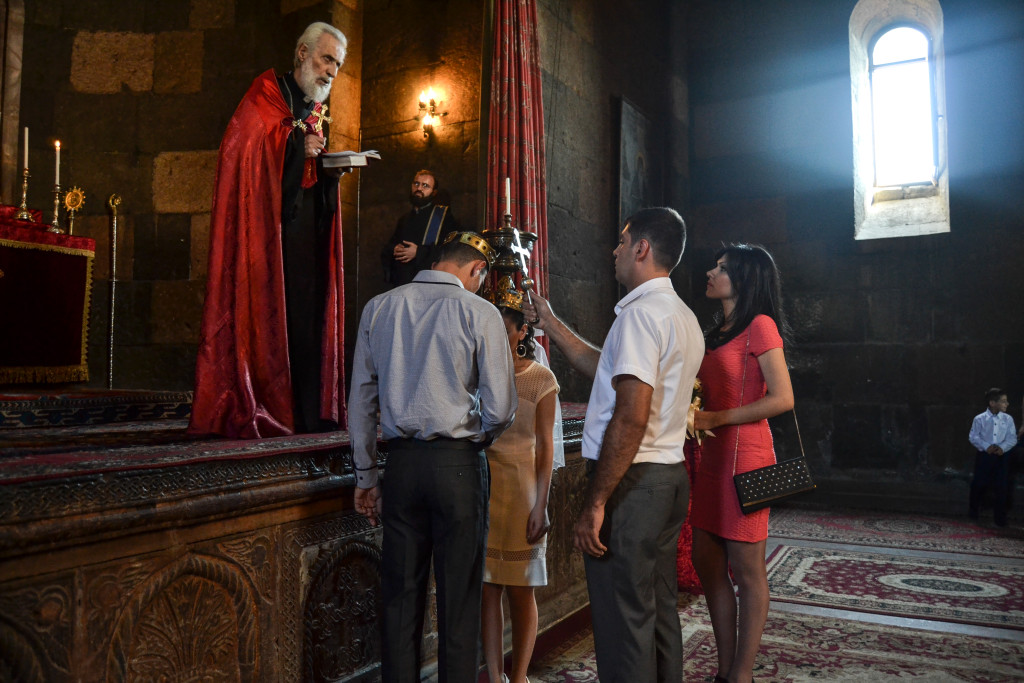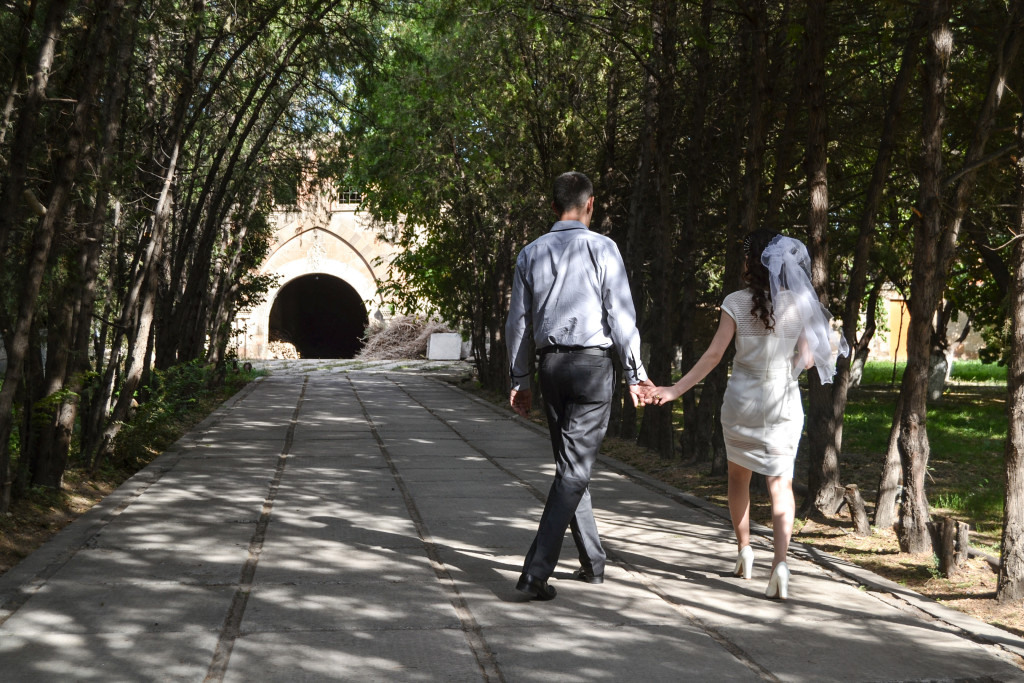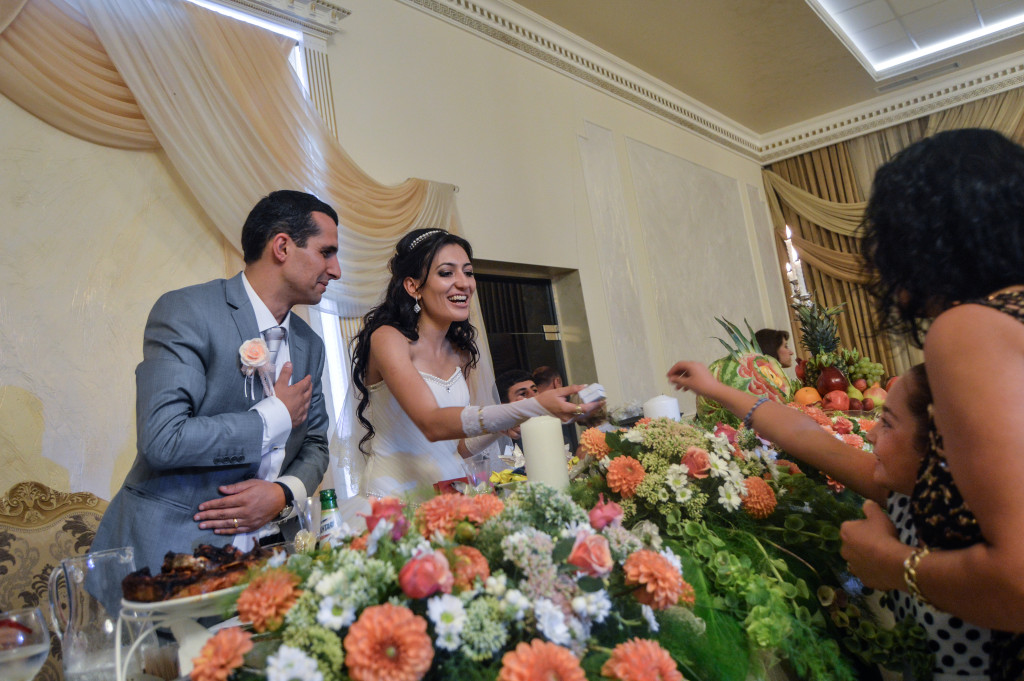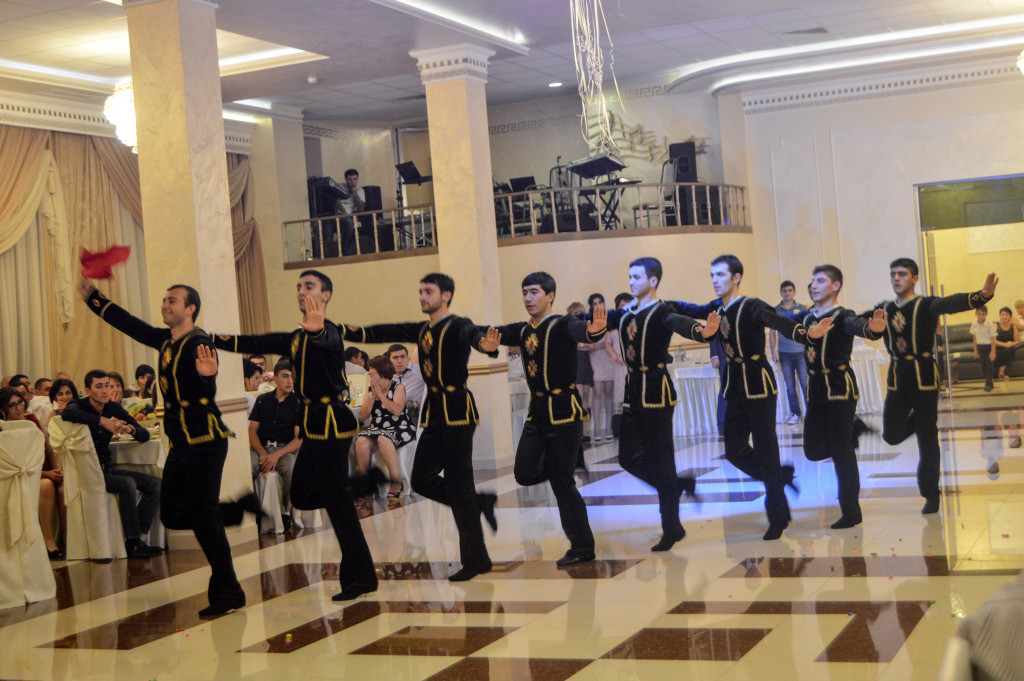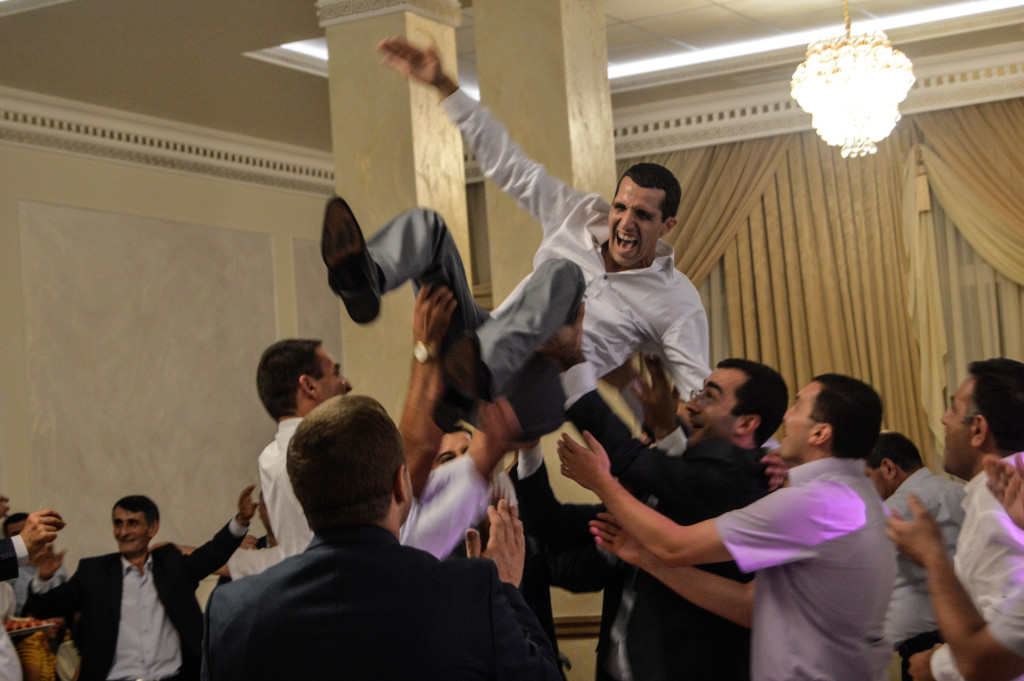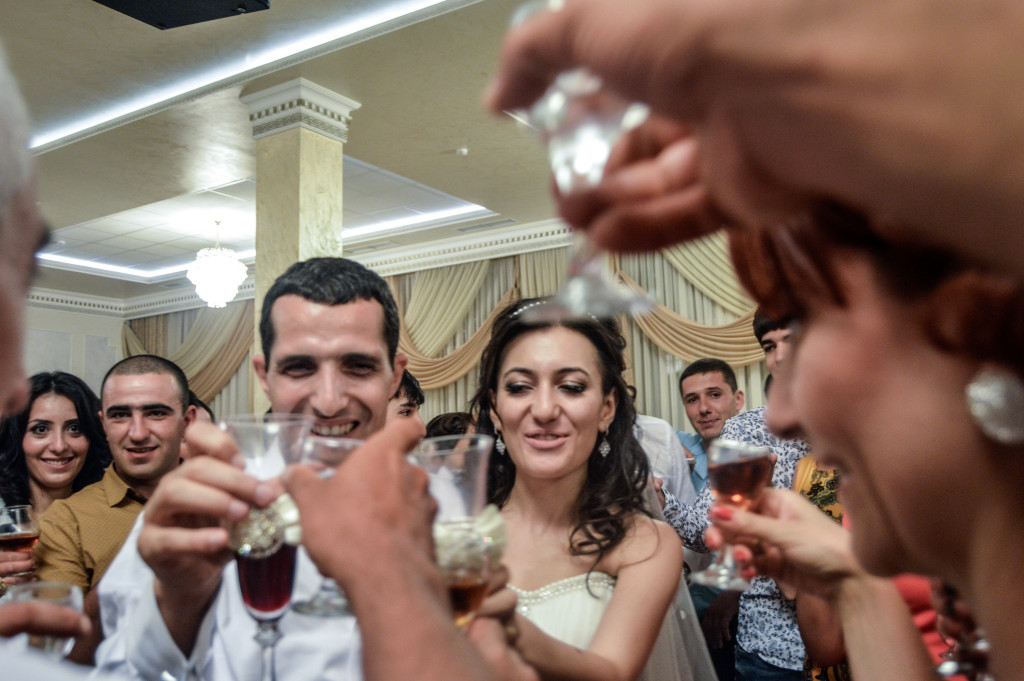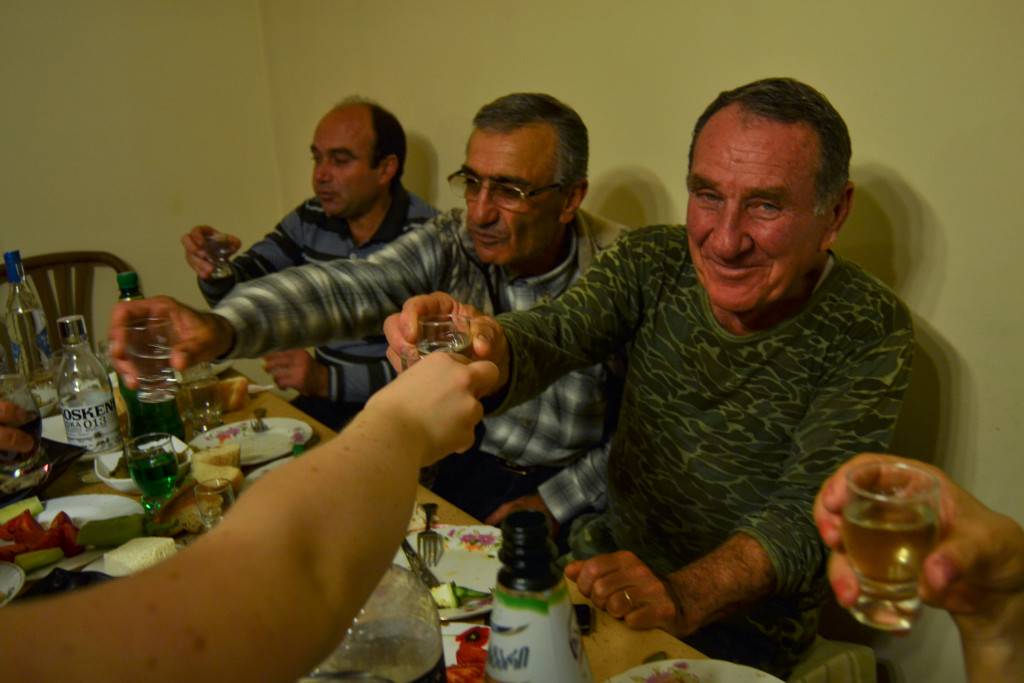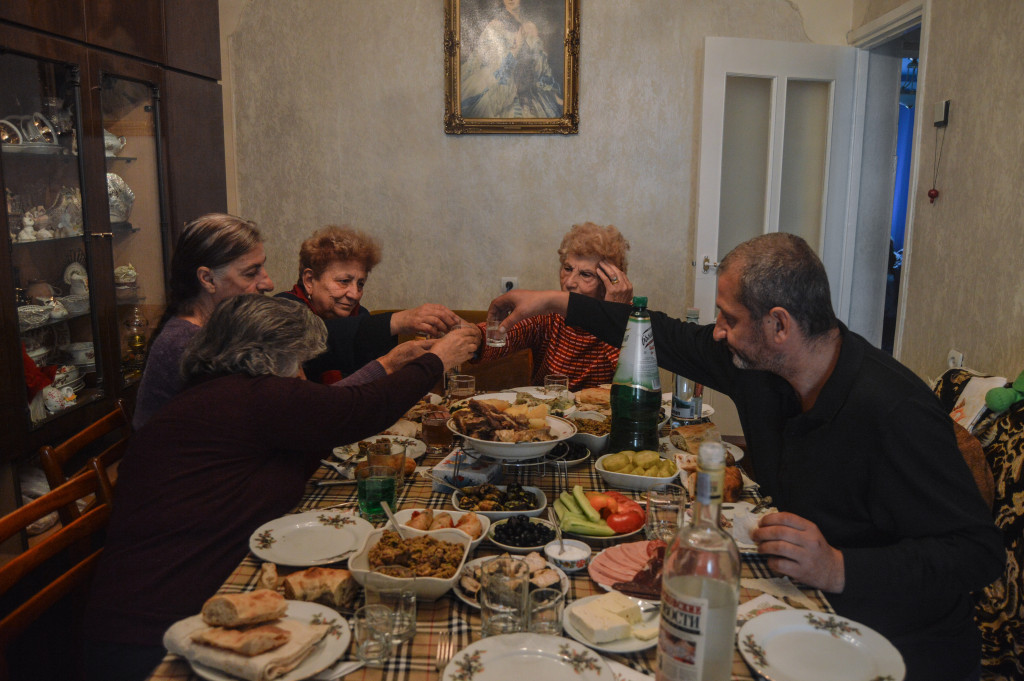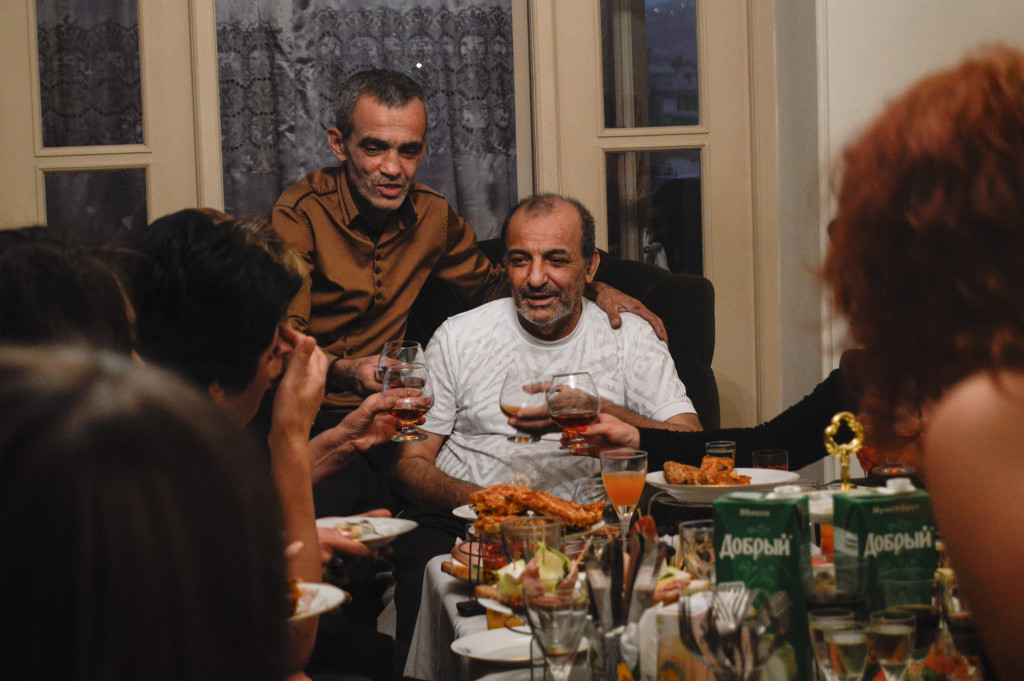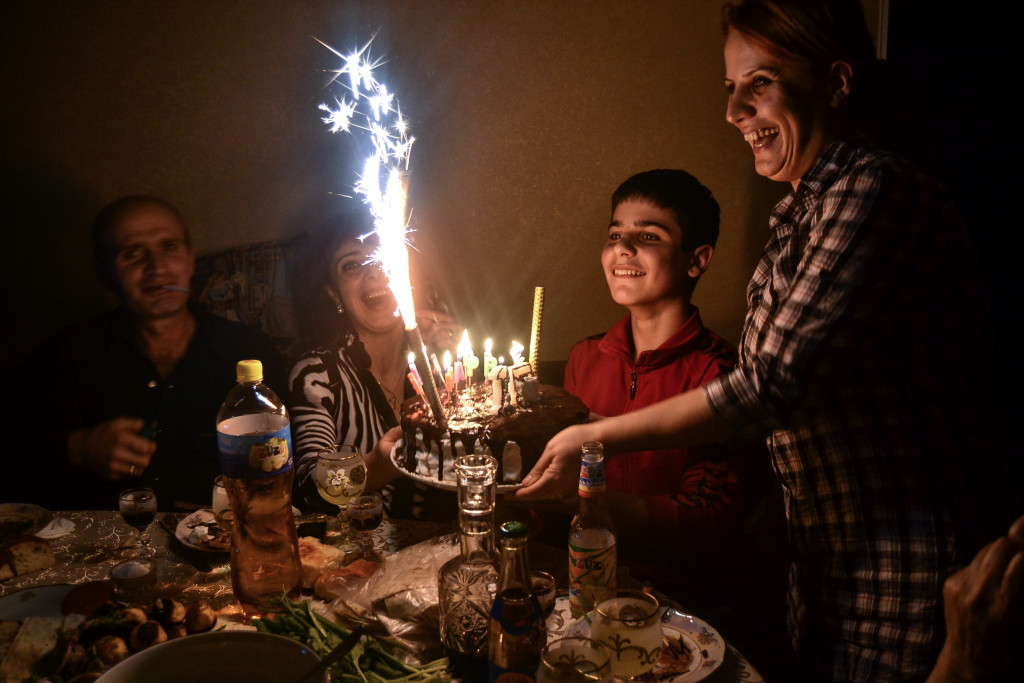Caption: Yerevan, Armenia- Dec. 13, 2014: According to the Bible, Noah's ark landed on the mountains of Ararat - the twin peaks that dominate the skyline of Armeniaís capital, Yerevan. Although they are currently located in eastern Turkey, these two mountains, part of historic Armenia, hold a special place in the Armenian identity. Project Summary: This photo series is the combined work of nine students ages 14 to 19 from the Tumo Center for Creative Technologies, a state-of-the-art after-school learning environment in Yerevan, Armenia. Armenia is a tiny landlocked country in the South Caucasus with a small and homogeneous population of roughly 3 million, 98% of whom are ethnic Armenians. The stories told by these nine teenagers paint a broad picture of the everyday joys and struggles of Armenian families. A wide spectrum of themes that are prevalent to Armenian family life were captured through their lenses, and enhanced through their writing. These themes include: Big families Armenian families tend to be large and tight-knit. We rarely use the word ìcousinî, referring to our extended family members as brothers and sisters. Grandparents, especially grandma (tatik) play a central role in childrearing and often, out of necessity, several extended family members live under one roof. This physical proximity - with both its challenges and its rewards - is one of the defining characteristics of the Armenian family experience. Labor migration With an unemployment rate of around 18% and only 25% of adults having permanent employment, Armenians are leaving the country in droves. Some emigrate permanently while others leave for seasonal stints of migrant labor, most commonly in Russia. Although reliable figures on the number of Armenians working in Russia do not exist, according to the Eurasia Partnership Foundation, 31 percent of Armenians have at least one family member working in Russia. Urban migration Another type of labor migration - rural to urban - i
Caption: Yerevan, Armenia- July 3, 2014: My grandfather, Harut, looks out the window waiting for his daughter.
Caption: Yerevan, Armenia- July 22, 2014: Grandmother Zenfira Barsegyan points to her "young and patriotic" husband, Spartak, in a photograph taken in Shushi during the Nagorno-Karabakh war in 1993. Personal Text: My grandmother is not only my grandfatherís wife; she is also his eyes and his tongue. He doesnít like to talk about his memories. Tatik has told us that papikís friend was killed by shrapnel shells right in front of his eyes, and the stress of living and reliving that moment is what led to his diabetes. Papik doesnít sit in front of the window that faces Mount Ararat, though it wouldnít really matter if he did. Itís not the wall, but his blindness that blocks his view. The blindness, caused by the diabetes, has separated him from his relatives. He doesnít even go to his special corner in the garage anymore, where he has collected his entire life story through photos, icons, medals from the Karabakh war andÖthe shrapnel shells that killed his friend. And now, every two months when my father travels to the Karabakh border with the military, papik listens to the news on the radio and constantly asks, ìWhatís the date today?î He is the last person to hug his son upon his return, always waiting for the stampede of hugs and kisses to clear. But he is the first to feel that my father is approaching. Without saying a word, he raises his head and starts sniffing the air.
Caption: Yerevan, Armenia- August 4, 2014: Grandfather Spartak Khachatryan by the radio listening to news about ongoing tensions between Azerbaijan and Armenia over the disputed territory of Nagorno-Karabakh- where his son(my father) is based. Personal Text: My grandmother is not only my grandfatherís wife; she is also his eyes and his tongue. He doesnít like to talk about his memories. Tatik has told us that papikís friend was killed by shrapnel shells right in front of his eyes, and the stress of living and reliving that moment is what led to his diabetes. Papik doesnít sit in front of the window that faces Mount Ararat, though it wouldnít really matter if he did. Itís not the wall, but his blindness that blocks his view. The blindness, caused by the diabetes, has separated him from his relatives. He doesnít even go to his special corner in the garage anymore, where he has collected his entire life story through photos, icons, medals from the Karabakh war andÖthe shrapnel shells that killed his friend. And now, every two months when my father travels to the Karabakh border with the military, papik listens to the news on the radio and constantly asks, ìWhatís the date today?î He is the last person to hug his son upon his return, always waiting for the stampede of hugs and kisses to clear. But he is the first to feel that my father is approaching. Without saying a word, he raises his head and starts sniffing the air.
Caption: Yerevan, Armenia- August 4, 2014: My mother Kristine welcomes my father, Andranik, home after his one stint on the border. Personal Text: My grandmother is not only my grandfatherís wife; she is also his eyes and his tongue. He doesnít like to talk about his memories. Tatik has told us that papikís friend was killed by shrapnel shells right in front of his eyes, and the stress of living and reliving that moment is what led to his diabetes. Papik doesnít sit in front of the window that faces Mount Ararat, though it wouldnít really matter if he did. Itís not the wall, but his blindness that blocks his view. The blindness, caused by the diabetes, has separated him from his relatives. He doesnít even go to his special corner in the garage anymore, where he has collected his entire life story through photos, icons, medals from the Karabakh war andÖthe shrapnel shells that killed his friend. And now, every two months when my father travels to the Karabakh border with the military, papik listens to the news on the radio and constantly asks, ìWhatís the date today?î He is the last person to hug his son upon his return, always waiting for the stampede of hugs and kisses to clear. But he is the first to feel that my father is approaching. Without saying a word, he raises his head and starts sniffing the air.
Caption: Yerevan, Armenia- July 11, 2014: My grandmother Susanna in line at the meat market. Personal Text: My tatik would do a better job of cutting meat with a hand fan than the butcher is doing with an axe. Iíve witnessed it myself. But other than her hands, her strength is also in her spirit. She has lived through difficult years of the 1990s - earthquake, war, blockade, hunger - the dark, cold years. Susanna tatik is made of strength, creativity, and wit. During those difficult years, when my grandpa was trying to economize, she ask him for money claiming that she wanted to buy him a shirt, then spend the money on things for the kids and present him with an old shirt from the back of closet, pretending it was new. The meat has already become a fragrant dinner, but filling my tummy isnít enough for my grandma. She canít possible send me home empty-handed. I have to take a portion of dolma home for my mother. And thatís not all - she has to leave money in my pocket, too. If I dash out without taking it, sheíll call out from the fifth floor and drop the money down with a clothespin.
Caption: Lanjaghbyur, Armenia- July 25, 2014: My grandmother Anahit Davtyan comforts her granddaughter Ani, 11, at their village home in Lanjaghbyur. Personal Text: 5:30 Wake up, morning coffee, Grandma milks the cows. 6:30 Grandpa takes the cows and sheep out onto the street so that the shepherd can take them to the hills with the rest of the herd. 7:00 The men have another coffee, the women prepare food to be taken out to the hills. 7:15 My uncles load the the mower and the sickles into the car. 7:40 Breakfast, third coffee, the men go to the hills to cut hay. 18:00 Return from the hills, short break in the yard, fifth coffee, this time with the neighbors (the fourth was out in the hills). A chance to breathe, conversations and political debate: Uncle Arsen: I wonder if Azerbaijan will start the war again... Grandpa Spartak: If Russia withdraws, then there will definitely be a war. Uncle Garnik: Forget Russia, itís all about America; whatever they say goes. 20:00 Back to work. Grandpa takes the sheep and the cows to the barn. 20:15 Grandma milks the cows and my uncles go back to the hills for more hay. 21:30 Everyone gets together and has dinner. 22:30 Grandpa goes to sleep and my uncles go to play dominoes with their friends. 24:00 My uncles return, Uncle Arsen turns on the computer to catch up with the dayís news. 1:30 The last person awake goes to sleep.
Caption: Yerevan, Armenia- July 30, 2014: Vartanush Margaryan with her granddaughter Syuzi. Personal Text: Suzieís mother passed away two years ago. Now she wonít go to sleep until her grandmother holds her hand. When they were at a party at a relativeís house, she wouldnít sleep because she was afraid that the celebration, her grandma would leave her just like her mom did.
Caption: Yerevan, Armenia- November 21, 2014: My brother Harut, only three days old, comfortably wrapped up after a bath.
Caption: Yerevan, Armenia- July 19, 2014: My grandmother Tamara taking a nap at our home in Yerevan after a day's work. Personal Text: My tatik has run away only once. She was 20 years old and they came to marry her off against her will, so she ran and hid under the covers. Since then, she has never hidden from the truth. She didnít hide during the years when bread was rationed, or when there was no bread at all. She didnít hide after the earthquake; when the factory where she used to sew hats was one of the many that got shut down, and she was left jobless for years; when her husband got sick; when she sent her son off to the army; when she married off her daughterÖ Now she should be able to enjoy the fruits of her labor, but she is still tense. The stone woman,who remains alert even when she is resting.
Caption: Yerevan, Armenia- July 19, 2014: My grandmother Tamara home after a day's work. Personal Text: My tatik has run away only once. She was 20 years old and they came to marry her off against her will, so she ran and hid under the covers. Since then, she has never hidden from the truth. She didnít hide during the years when bread was rationed, or when there was no bread at all. She didnít hide after the earthquake; when the factory where she used to sew hats was one of the many that got shut down, and she was left jobless for years; when her husband got sick; when she sent her son off to the army; when she married off her daughterÖ Now she should be able to enjoy the fruits of her labor, but she is still tense. The stone woman,who remains alert even when she is resting.
Caption: Zovk, Armenia- August 24, 2014: My grandmother Marieta Karapetyan on her way to feed her chickens at their farm in Zovk, a village with population of less than 1,000. Personal Text: ìNo, no, Iím not going to stay. My house, my garden, my birds and chicks, my rabbits, my apricots, my apple trees... No, no, Iím not going to stay.î This is the answer every single time we ask Tatik to stay at our house, stroll around Yerevan, enjoy the atmosphere in the capital city, and go window shopping with us in the fancy shops.
Caption: Yerevan, Armenia- July 20, 2014: My uncle Armen Gyozalyan having a coffee before leaving for Moscow. Personal Text: The final cigarette and the final coffee (prepared by me). I wonder whose coffee he’s praising now. Many of my neighbors and friends have gone, some to Europe, others to the USA or Russia, because they couldn't find work in Armenia. But who would have thought that my uncle would join the army of migrant workers? I spent my childhood on his shoulders. I sat on his shoulders for one month straight when I was three years old, when my whole family was busy with my brother who had just come into this world. My first musical instrument was his bare forehead, where I would drum my fingers. The world seemed so small when I was on his shoulders. Even my newborn brother, who had filled up the whole house with his presence, seemed small.
Caption: Yerevan, Armenia- September 29, 2014: My uncle Armen Gyozalyan, in Russia, skyping with his wife Alina and 10-month-old son Vahe in Armenia. Personal Text: My Uncle Armen is already in Russia and he has found a job in a pastry shop which pays him more than he made in Yerevan. He is actually an amazing chef, but in Armenia he didnít always have work. The last cake he baked was an unpaid ìorderî for my birthday. It was delicious. When his 8-month-old son Vahe speaks to him on Skype, he beckons him with his hand and says,ìCome, come!î A few months ago he was on his fatherís lap, pulling at his short beard. But now, instead of that warm and spiky porcupine, he strokes the cold, flat screen. Itís not clear yet when heíll be able to sit on his fatherís shoulders and drum on his bald head, like I used to so many years ago.
Caption: Yerevan, Armenia- July 14, 2014: My grandparents Harut Harutyunyan, left, and Armik in Armenia Skyping with their daughter and granddaughter living in Russia. Personal Text: Iím woken up by Skype. Again. Mary is already up so of course she has to wake us up too. She wants to talk to Tatik, who will praise her when she recites the new poems that sheís learned. My aunt has made the coffee and is waiting for Tatik and Papik. They talk, have their coffee, they even manage to discuss what theyíll eat today. The call is interrupted because itís Maryís naptime. And againÖ It hasnít even been three hours, but Mary is awake and has to talk to Tatik while she eats, telling her about her new toys and her pink dress. However tired or bored I may be, I donít complain. My grandparents havenít seen their daughter in over two years. Telling stories and teaching poems to little Mary through Skype is not just high tech grandparenting - it also gives my aunt a break so that she can get her work done.
Caption: Yerevan, Armenia- September 22, 2014: My mother Kristine sewing at home. Personal Text: ìIt will suit Amal tatik, right?î It turned out to be a little long, but thatís okay. My mother will hem it and make it work. With this same loving touch, on the 31st of every second month, she washes, mends and sorts my fatherís military uniform. Of course my father has to look immaculate when he goes to Karvachar. He guards the border. My mother and father were in the same class since the second grade. Even my fatherís conscription couldnít separate them. Although his father, who had volunteered to fight in the war, was very strict with his son, my father would sometimes escape the army, even for an hour, to see my mother. Now that my father guards the border, they are sometimes forced to be apart. My mother becomes stressed, she gets upset over minor things, and the only thing that forces a smile on her face, letting her forget about the unwashed dishes, the childrenís incomplete homework and the unironed clothes, is my fatherís return.
Caption: Yerevan, Armenia- July 30, 2014: My mother Lilit Kotinyan at home with work. Personal Text: I hate it when my mother brings her half-finished work home with her. She becomes cold, distant, unapproachable and distracted. She even shoos her dear waggly tailed Mimi off the sofa, and she only says one word to me - ìwaitî. The holidays are coming, so she will re-emerge soon - the beautiful, single, emotional, ambitious and funny woman who my sister and I try to emulate. Together, we form the all-female Kotinyan household: an accountant, a dentist and an aspiring economist.
Caption: Yerevan, Armenia- August 7, 2014: My mother Lilit Kotinyan at home having a moment to herself. Personal Text: I hate it when my mother brings her half-finished work home with her. She becomes cold, distant, unapproachable and distracted. She even shoos her dear waggly tailed Mimi off the sofa, and she only says one word to me - ìwaitî. The holidays are coming, so she will re-emerge soon - the beautiful, single, emotional, ambitious and funny woman who my sister and I try to emulate. Together, we form the all-female Kotinyan household: an accountant, a dentist and an aspiring economist.
Caption: Yerevan, Armenia- July 24, 2014: Self-portrait of myself making my bed in the morning. Personal Text: Dear walls, windows, piano, cups, and my brotherís dopey turtles hiding under the table, Only you know that other than blasting Serj Tankian, dancing around, singing like a crow, dreaming and chatting with friends, I also do housework. I am: a kind of crazy photographer, a chatty friend, an algebra-loving student, an energetic teenager, and a caring aunt. Iím also a domestic goddess.
Caption: Yerevan, Armenia- July, 19, 2014: My mother, Mariam takes a moment to rest during one of her 14-hour shifts. Personal Text: Selling beauty... There are plenty of customers, everyone wants to buy it: those who are conceited and those who think they are ugly. Some smile, others scowl; some demand while others ask politely; some hopeful, others prepared for disappointment; some looking for common products that theyíve seen in advertisements, others in search of strange things that youíve never even heard of; some choose quickly, others go through every shelf in the shop and try everything one by one until they find that red lipstick, that green hair dye, that blue mascara, or that piece of jewelry that will make them more beautiful. These are her days, day in day out. Working 14-hour shifts, waiting on everyoneís whim. There is an Armenian saying: work makes a person beautiful. This beauty, exhausted after spending the past 10 hours selling self-esteem to others, has shut her eyes for a well-deserved break.
Caption: August 8, 2014: My sister Lara, 22, putting on her morning makeup. Personal Text: Dr. Kotinyan is how they address her at the dentistís office, some with fear and hesitation and others with awe. But within the four walls of home, sheís just Lara. Lara, the mama of waggy-tailed Mimi; Lara, my sleepyhead sister; Lara, momís chubby treasure; our crazy, chichi Lara. When we were younger, the two of us would organize concerts every month. We would make tickets and sell them to our relatives and neighbors for 50 dram. Now she is a solo act, and Iím her only audience. During intermission, we put an experimental pizza in the oven and often, because we start goofing off and get distracted, we end up having to eat a dry, burnt pizza. After all our artistic and culinary experiments, we settle down to watch a movie. No matter how silly we get, I will never forget that Dr. Kotinyan is a well-established, self-confident dentist, who is able to help support her family, me and my mother. I am happy that my sister strives to be like my mother: independent, strong and free.
Caption: August 7, 2014: My sister Lara, 22, at home singing and dancing. Personal Text: Dr. Kotinyan is how they address her at the dentistís office, some with fear and hesitation and others with awe. But within the four walls of home, sheís just Lara. Lara, the mama of waggy-tailed Mimi; Lara, my sleepyhead sister; Lara, momís chubby treasure; our crazy, chichi Lara. When we were younger, the two of us would organize concerts every month. We would make tickets and sell them to our relatives and neighbors for 50 dram. Now she is a solo act, and Iím her only audience. During intermission, we put an experimental pizza in the oven and often, because we start goofing off and get distracted, we end up having to eat a dry, burnt pizza. After all our artistic and culinary experiments, we settle down to watch a movie. No matter how silly we get, I will never forget that Dr. Kotinyan is a well-established, self-confident dentist, who is able to help support her family, me and my mother. I am happy that my sister strives to be like my mother: independent, strong and free.
Caption: Goght, Armenia- July 4, 2014: My grandfather Kamsar Margaryan and his older brother Vardan at the elderís home in the village of Goght. One lives in the city with a population of one million while the other in a village of 1,000. Personal Text: When they were small, you could barely tell the two brothers apart, because Kamsar used to wear Vardanís hand-me-downs. But now they look different. Kamsar, who lives in the capital, is in the village to visit Vardan, who has just returned from watering the trees.
Caption: Yerevan, Armenia- August 14, 2014: My father, Armen, working in the yard as my grandfather, Shakespeare, looks on. Personal Text: My father and grandfather are continuing my great-great-great-great-great grandfatherís dynasty. Three generations are represented here: the past - Shakespeare with his walking stick, the present - Armen with his hammer, and the future - me with my camera. My father threatened and intimidated the old wall until it was weak at the knees. Two hours later, it was a corpse lying on the floor. He used the rubble from that wall to line a beautiful artificial stream. My father comes from a long line of men who have transformed ruins into beauty. His father Shakespeare, Shakespeareís father Varazdat, Varazdatís father Martiros, Martirosí father Mkrtich, all the way to my five-times-great-grandfather Karapet Karapetyan - all of these men built things up from rubble.The only difference is that the ruins they were forced to rebuild were those left behind by enemies.
Caption: Armenia- July 23, 2014: My 10-year-old cousin Tigran standing in a field behind their home in the village of Lanjaghbyur- a village of 2,000. Personal Text: Itís not easy to catch Tigran standing still like this. When I talk to my cousin for a little too long about the construction of the human head, the oblong brain and the axes, he gets baffled, and itís finally possible to take a photo of him. Then when he starts talking about BMWs, Mercedes Benz C Class and Bugatti Veyron, itís my turn to be baffled. My head is free of these brands only when the calf has grazed a circle around itself Tigran has to move him to somewhere with more grass. Sometimes the calf doesnít want to move from its spot, probably preferring to listen to our conversation. If this goes on, Tigranís calf will become Lanjaghbyurís first phrenologist...or its first mechanic.
Caption: Yerevan, Armenia- August 14, 2014: My mother finds a horse during a holiday trip to Dilijan.
Caption: Geghanist, Armenia- July 10, 2014: Watching a sunrise with my grandmother. Personal Text: In the summer, I often go to visit my Aunt Zepyurís family. In their village, I am able to fully relax, cut myself off from the bustle of the city, and take a break from my school books (even though the village is very close to the airport and you constantly hear the noise of airplanes overhead). Many have left the village on the very planes that fly over it. Recently, my other aunt, Tamar, and her family have joined their ranks. They have gone to Russia as they prefer big cities. And now, Aunt Zepyur and I sit together by the window and enjoy the beauty as the elements of nature blend together as one: the rain, the snow and the sun. With every flying plane, we remember the day that Aunt Tamar left. She probably misses the tranquility of the village after living in a overpopulated and loud city.
Personal Text: Sometimes, you just have to sit on top of the world and hang your feet so that no one is worthy of looking at your face, and you can gaze over everyone from above.
Caption: Armenia- July 26, 2014: My cousin in the back of a truck in Lanjaghbyur- a village of 2,000.
Caption: Meghradzor, Yerevan- June 6, 2014: My mother, Karine, enjoying a day in the outdoors. Personal Text: The freshly cut grass - warm, soft; the river - cool, soft; the barbequed fish - bony, soft. What a wonderful dayÖ This is my mother, waiting with a smile, until I take her photo. She went into the water with slippers on and whole time I was worried that the current would carry them away. Though even if it had, another amusing memory would have been added to that dayís cool and carefree getaway from the city. We had escaped the city; my mother had escaped us all.
Caption: Lake Sevan, Armenia- August 12, 2014: My cousins drying off after a swim in Lake Sevan.
Caption: Geghanist, Armenia- July 12, 2014: My cousin Manuk, 13, drenches us during Vardavar. Personal Text: Everyone takes part in Vardavar. No one bothers to think about their makeup, their hair or what theyíre wearing. Even my auntís husband, who is a serious lieutenant, turns into a child on this day and runs around with the other children while they drench each other with water until every last bit of clothing is soaked. My sisters donít hide their soaked hands, feet and bodies, unlike the Armenian pagan goddess Astghik, to whom the celebration is dedicated. According to the legend, she hid her body from her lovers who followed her when she went into the river by spreading fog all around.
Caption: Geghanist, Armenia- July 12, 2014: My Aunt's husband, Kostya, drenched and defeated on Vardavar. Personal Text: Everyone takes part in Vardavar. No one bothers to think about their makeup, their hair or what theyíre wearing. Even my auntís husband, who is a serious lieutenant, turns into a child on this day and runs around with the other children while they drench each other with water until every last bit of clothing is soaked. My sisters donít hide their soaked hands, feet and bodies, unlike the Armenian pagan goddess Astghik, to whom the celebration is dedicated. According to the legend, she hid her body from her lovers who followed her when she went into the river by spreading fog all around.
Caption: Yerevan, Armenia- July 23, 2014: My grandmother, Juliet, handing my father, Armen, tomatoes to skewer. Personal Text: Itís Juliet tatikís birthday. She wonít allow Shakespeare papik to take a nap, nor will she allow my father to prepare the food for the barbeque in peace. Today, she is the commander. On any other day, sheís just another police officer, doling out warnings and sideways glances which all revolve around one phrase: amot a (itís shameful). Mariam dear, donít take a photo right now, amot a, let me put on something nicer; A girl canít keep repeating the same things, amot a; Calm down, youíre not crazy are you? Amot a; Screw your head back on, youíre a girl. Amot a; One of thse days youíre going to get married. Do you want them to think you were raised in the streets? Amot a. I think Shakespeare papik should live up to his name and write a play. And find a way to work in the line: ìShame, thy name is woman.î
Caption: Yerevan, Armenia- August 14, 2014: My father, Arsen, skewering meat to grill. Personal Text: My father makes delicious barbecued food. Those who have been fortunate enough to try it can tell you. Because my mother often works late, every once in a while, my father makes other dishes too, like harissa, khash, oven roasted pork with potatoes, rice and spaghetti. My fatherís menu would suit a five star restaurant, but he doesnít do it for the culinary glory; he does it for the look on my motherís face when she comes home from work exhausted and sees that dinner is ready.
Caption: Lake Sevan, Armenia- August 12, 2014: My cousin Erik, 9, enjoying the first grill. Personal Text: ìI beat everyone, the first one is mine! I beat you too! Hey, why are you taking a photo?î Every time we go to Lake Sevan or when we get together with the family, spirited, skinny Eric brightens the mood. Even those who swat him away like a fly eventually break down into fits of laughter.
Caption: Lake Sevan, Armenia- August 12, 2015- My parents Vartan and Zaruhi have a picnic near Lake Sevan. Personal Text: For the past nine months, my motherís appetite has ruled our house; my brother will be born soon. If a pregnant woman craves something, the rule is her husband has to get it for her, period. Even in the middle of the night, or in the middle of the worst storm. Of course, my mother craves the most expensive exotic fruits, like pineapples. But sometimes the rulemaker, a mother of three, breaks her own rule. She settles for watermelon, the most inexpensive local fruit, which is already very cold from sitting in the river. Itís extra sweet when you can share it with your family and friends.
Caption: Dilijan, Armenia- August 14, 2014: My parents, Mariam and Askanaz, resting during a day trip to Dilijan. Personal Text: I see them only in the late evening. My mother comes home, often after working a 14-hour shift. She spreads her arms as wide as the clouds and says, ìCome give me a hug!î My father returns home after spending the whole day tied up in electric wires. He hasnít forgotten to pick up our ìorderî of chocolates, pizza dough, a top-up card and a kiss, but he forgets to ask me and my brother about our classes and goes to bed exhausted. After taking this photo, I will run and give them both hugs, even if I interrupt them. Iím content knowing that I have captured this moment, when a man takes his chosen one, lays down next to her, and admires his choice.
Caption: Goght, Armenia- July 4, 2014: A family get-together. Personal Text: Even my grandma scolds my brother Allen, but when others are too harsh with him, Grandma takes him into her arms. But today, no one has time for Allen because my other brother David has come home victorious after scoring two goals against Arsenal Tula. Aunt Armineís eyes glisten as she tells the story. This year, my sister Liana graduated from school in Russia and came to Armenia to study at university. Grandma, my brother Vardan and my brother Vahik were very happyÖ We have a word for ìcousinî in Armenian, but we rarely use it. We use brother and sister instead.
Caption: Lanjaghbyur, Armenia- July 25, 2014- Narine, my uncle's wife, picks strawberries at their village home in Lanjaghbyur. Personal Text: ìDonít trample on it!î shouts Narine, at anyone who goes into the vegetable garden. Every morning, she tends to the plants and picks the juicy strawberries. Aside from that, she helps my grandpa and uncle move bales of hay that are as big as she is. And in the evening, however tired she may be, she has to look after the bees. She replaces the thin sheets with thick ones and closes the covers of the hives. She is not burdened by all this work; she genuinely enjoys it.
Caption: Lanjaghbyur, Armenia- July 31, 2014- Narine, my uncle's wife, moves bales of hay at their home in the village of Lanjaghbyur. Personal Text: ìDonít trample on it!î shouts Narine, at anyone who goes into the vegetable garden. Every morning, she tends to the plants and picks the juicy strawberries. Aside from that, she helps my grandpa and uncle move bales of hay that are as big as she is. And in the evening, however tired she may be, she has to look after the bees. She replaces the thin sheets with thick ones and closes the covers of the hives. She is not burdened by all this work; she genuinely enjoys it.
Caption: Lanjaghbyur, Armenia- July 31, 2014- Narine, my uncle's wife, tends to her bees at their home in the village of Lanjaghbyur. Personal Text: ìDonít trample on it!î shouts Narine, at anyone who goes into the vegetable garden. Every morning, she tends to the plants and picks the juicy strawberries. Aside from that, she helps my grandpa and uncle move bales of hay that are as big as she is. And in the evening, however tired she may be, she has to look after the bees. She replaces the thin sheets with thick ones and closes the covers of the hives. She is not burdened by all this work; she genuinely enjoys it.
Caption: Lanjaghbyur, Armenia- August 10, 2014- My grandfather Spartak, left, and my uncle Arsen preparing the animal that will be the feast ay my birthday tonight. Personal Text: Uncle Karen loves Lanjaghbyur. He is very attached to the land and water there. He enjoys the village lifestyle; in addition to agricultural work, he is also a teacher at the school. But Uncle Arsen doesnít like the village at all, especially the heavy manual work. He constantly complains and mutters under his breath. He says he wants to leave the village. But itís not so easy to leave a place where you have lived your entire life, where your parents and relatives live. His grievances are calmed when his enjoys the fruits of his labor: the barbequed meat of the mutton he raised, the harvest from the apple trees he watered, the potatoes that he planted, cooked over the flame that he built...
Caption: Lanjaghbyur, Armenia- July 31, 2014- My uncle Karen, left, and grandfather Spartak shoveling hay. Personal Text: Uncle Karen loves Lanjaghbyur. He is very attached to the land and water there. He enjoys the village lifestyle; in addition to agricultural work, he is also a teacher at the school. But Uncle Arsen doesnít like the village at all, especially the heavy manual work. He constantly complains and mutters under his breath. He says he wants to leave the village. But itís not so easy to leave a place where you have lived your entire life, where your parents and relatives live. His grievances are calmed when his enjoys the fruits of his labor: the barbequed meat of the mutton he raised, the harvest from the apple trees he watered, the potatoes that he planted, cooked over the flame that he built...
Caption: Lanjaghbyur, Armenia- August 8, 2014- Taking an afternoon coffee break from work. Personal Text: 5:30 Wake up, morning coffee, Grandma milks the cows. 6:30 Grandpa takes the cows and sheep out onto the street so that the shepherd can take them to the hills with the rest of the herd. 7:00 The men have another coffee, the women prepare food to be taken out to the hills. 7:15 My uncles load the the mower and the sickles into the car. 7:40 Breakfast, third coffee, the men go to the hills to cut hay. 18:00 Return from the hills, short break in the yard, fifth coffee, this time with the neighbors (the fourth was out in the hills). A chance to breathe, conversations and political debate: Uncle Arsen: I wonder if Azerbaijan will start the war again... Grandpa Spartak: If Russia withdraws, then there will definitely be a war. Uncle Garnik: Forget Russia, itís all about America; whatever they say goes. 20:00 Back to work. Grandpa takes the sheep and the cows to the barn. 20:15 Grandma milks the cows and my uncles go back to the hills for more hay. 21:30 Everyone gets together and has dinner. 22:30 Grandpa goes to sleep and my uncles go to play dominoes with their friends. 24:00 My uncles return, Uncle Arsen turns on the computer to catch up with the dayís news. 1:30 The last person awake goes to sleep.
Caption: Lanjaghbyur, Armenia- August 1, 2014: My uncle Spartak, right, waiting for his herd of cows. Personal Text: My grandpa is waiting for the shepherd to bring the cows and sheep in from the hills. Telman waits with him. This name became popular during Soviet times, after the German communist leader Ernst Th‰lmann was assassinated by Hitler in 1944. Telman is something of an oddity among the warm-blooded villagers of Lanjaghbyur; he is ice cold. Even the cracked stone bench - where he has been sitting in the exact same spot, at the exact same time each day, with the exact same burnt out cigarette, for over 50 years - shivers from his iciness. His eyes are always focused on the same spot when he speaks or listens, and his features and expression are always the same. The villagers call him the Stone Man.
Caption: Yerevan, Armenia- August 3, 2014: My 15-year-old brother, Hayko, ready to shoot a rifle at an amusement park. Personal Text: I blinked and you are already 15 years old, brother Hayko. Maybe the next time I take a photo of you, Iíll be immortalizing the moment you go off to the army. And Iíll regret our arguments. Iíll regret having said: When are you going to go away for two years so I can live in peace? For now, let toy guns be enough to make you feel like a man.
Caption: Yerevan, Armenia- September 15, 2014: My brother Levon, 21, putting on his military uniform after a short visit. Personal Text: At school, he would come over during class just to find out if anyone had been bothering me, or to make sure I had eaten something. When he graduated, he began studying at university and working at the same time - not only so that he could assist with our expenses, but also to buy presents for me and my mother for every special occasion. He was forced to take on the role of my deceased father. The same hands that years ago helped me learn how to write the letters, are now tying the laces of military boots. When he was first conscripted to the army I was sad, but then I understood that my protector had become the protector of my countryís peace.
Caption: Yerevan, Armenia- October 12, 2014: My brother Levon, 21, whose completing his 2-year mandatory military service, is greeted by our cousin Anush during one of his visits home. Personal Text: At school, he would come over during class just to find out if anyone had been bothering me, or to make sure I had eaten something. When he graduated, he began studying at university and working at the same time - not only so that he could assist with our expenses, but also to buy presents for me and my mother for every special occasion. He was forced to take on the role of my deceased father. The same hands that years ago helped me learn how to write the letters, are now tying the laces of military boots. When he was first conscripted to the army I was sad, but then I understood that my protector had become the protector of my countryís peace.
Caption: Yerevan, Armenia- October 12, 2014: My brother Levon, 21, whose completing his 2-year mandatory military service, greets my grandmother during one of his visits home. Personal Text: At school, he would come over during class just to find out if anyone had been bothering me, or to make sure I had eaten something. When he graduated, he began studying at university and working at the same time - not only so that he could assist with our expenses, but also to buy presents for me and my mother for every special occasion. He was forced to take on the role of my deceased father. The same hands that years ago helped me learn how to write the letters, are now tying the laces of military boots. When he was first conscripted to the army I was sad, but then I understood that my protector had become the protector of my countryís peace.
Caption: Yerevan, Armenia- August 25, 2014: My brother's wife, Lilit, and her two day old daughter, Stella. Personal Text: Lilit did not have to check the label tied around the wrist to know which baby was hers; little Stella is the spitting image of her father.
Caption: Yerevan, Armenia- September 23, 2014: My cousin Grigor in church during a marriage ceremony. Personal Text: My cousinís fiancÈe refused to wear a traditional dress because she considered it an excessive luxury. But she didnít consider it an excessive luxury to get married in an old traditional Armenian church, which has become very fashionable since the collapse of the Soviet Union. Maybe these details - getting married in the 7th century St. Gayane church, the scarlet of the priestís robe - will be what makes the the day memorable for them, more than a white bridal gown would.
Caption: Yerevan, Armenia- September 23, 2014: My cousin Grigor with his newly married wife Taguhi. Personal Text: My cousinís fiancÈe refused to wear a traditional dress because she considered it an excessive luxury. But she didnít consider it an excessive luxury to get married in an old traditional Armenian church, which has become very fashionable since the collapse of the Soviet Union. Maybe these details - getting married in the 7th century St. Gayane church, the scarlet of the priestís robe - will be what makes the the day memorable for them, more than a white bridal gown would.
Caption: Yerevan, Armenia- September 9, 2014: My cousin Vahan and his newly married wife, Anush, during their wedding reception. Personal Text: Opa! Opa! The groomís friends are throwing him in the air. As the folk songs say, today, he is the king. The queen receives gold jewelry as gifts. Most of the 250 guests have given the bride jewelry, but only the mother of the bride gives a piece of gold jewelry to the hero of the night. The tamada spouts off his artful oration, delivering a series of rhyming toasts. After every single one, upbeat music is played and all the guests clink their glasses and have a drink. Each toast is complemented by a song or a dance. After the brideís solo dance, there is a performance of the traditional menís berd par (fortress dance). Itís a gift from the brideís grandfather.
Caption: Yerevan, Armenia- September 9, 2014: Traditional Armenian dancers perform at my my cousin's wedding reception. Personal Text: Opa! Opa! The groomís friends are throwing him in the air. As the folk songs say, today, he is the king. The queen receives gold jewelry as gifts. Most of the 250 guests have given the bride jewelry, but only the mother of the bride gives a piece of gold jewelry to the hero of the night. The tamada spouts off his artful oration, delivering a series of rhyming toasts. After every single one, upbeat music is played and all the guests clink their glasses and have a drink. Each toast is complemented by a song or a dance. After the brideís solo dance, there is a performance of the traditional menís berd par (fortress dance). Itís a gift from the brideís grandfather.
Caption: Yerevan, Armenia- September 9, 2014: My cousin Vahan thrown in the air during his wedding reception. Personal Text: Opa! Opa! The groomís friends are throwing him in the air. As the folk songs say, today, he is the king. The queen receives gold jewelry as gifts. Most of the 250 guests have given the bride jewelry, but only the mother of the bride gives a piece of gold jewelry to the hero of the night. The tamada spouts off his artful oration, delivering a series of rhyming toasts. After every single one, upbeat music is played and all the guests clink their glasses and have a drink. Each toast is complemented by a song or a dance. After the brideís solo dance, there is a performance of the traditional menís berd par (fortress dance). Itís a gift from the brideís grandfather.
Caption: Yerevan, Armenia- September 9, 2014: Toasts are made during my cousin's wedding reception. Personal Text: Opa! Opa! The groomís friends are throwing him in the air. As the folk songs say, today, he is the king. The queen receives gold jewelry as gifts. Most of the 250 guests have given the bride jewelry, but only the mother of the bride gives a piece of gold jewelry to the hero of the night. The tamada spouts off his artful oration, delivering a series of rhyming toasts. After every single one, upbeat music is played and all the guests clink their glasses and have a drink. Each toast is complemented by a song or a dance. After the brideís solo dance, there is a performance of the traditional menís berd par (fortress dance). Itís a gift from the brideís grandfather.
Caption: Yerevan, Armenia- September 5, 2014: My grandfather Vahan toasting on his 68th birthday. Personal Text: Click, and they are immortalized. After that click, many more clicks and clinks of glasses. I tried vodka for the first time. It was my grandfatherís birthday, after all. And they kept drinkingÖ a welcome toast, a toast to the children, a toast to the parents, a toast to world peace, a toast to uncles, a toast to the soldiers protecting our bordersÖ ÖThe one shot I drank was equivalent to the liters of toasts they drank to each other, to their mothers, their children, aunts, the country and the world; I slept like a corpse until morning, when my uncle called and woke me up. He was the one who persuaded me to drink yesterday, as a rite of passage toward the world of adults.
Caption: Yerevan, Armenia- September 14, 2014: Family and friends toasting around a lunch table. Personal Text: At wakes, when there is a toast, we touch the fingers holding the glasses, not the glasses themselves, so that the happy ring of clinking glasses does not disturb the respectful silence. Today though, we are clinking glasses. Itís my deceased grandfatherís birthday. He is missing not only from this photo, but from my life where I have no memories or feelings towards someone who passed away when I was only a few months old. But this isnít a photo of my grandfatherís absence. How can someone not attend his own birthday party? He is very much present, especially when his wife keeps telling stories about himÖ ìI said to him, ëAre you crazy?í, and he said, ëYouíre the crazy one, for taking this long to figure out that Iím craz
Caption: Yerevan, Armenia- August 21, 2014: My father Arsen, left, and his brother, Gevorg, toasting at a table full of family. Personal Text: My uncle and dad are excellent cooks. The two started honing their culinary skills at a young age. My grandparents used to work day and night for the railway. Papik was a train attendant and tatik was a cashier in the imports section, so my father and uncle did the housework. For all the ìwomensí workî theyíve done, theyíre no less ìmanlyî. Here they are at the head of the table, drinking traditional toasts.
Caption: Yerevan, Armenia- September 17, 2014: My brother, hayk, surrounded by family his 15th birthday.
